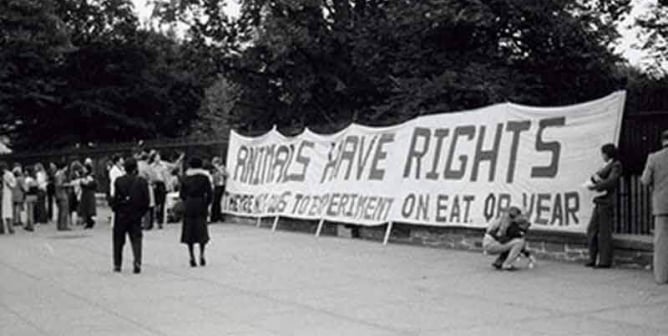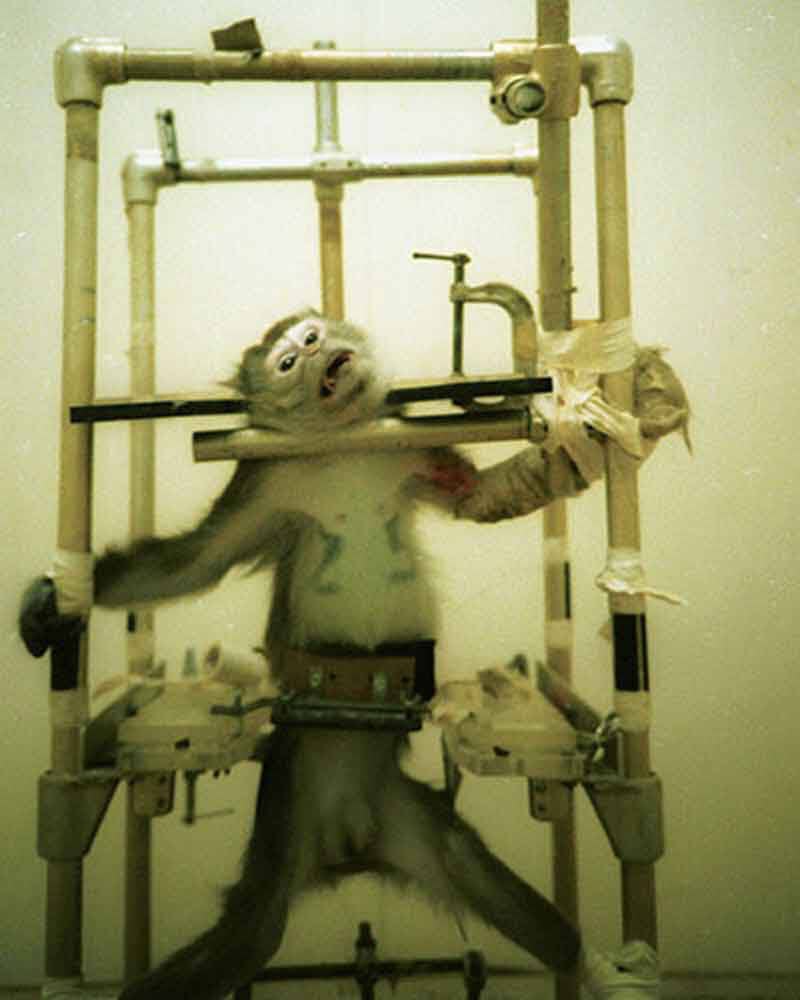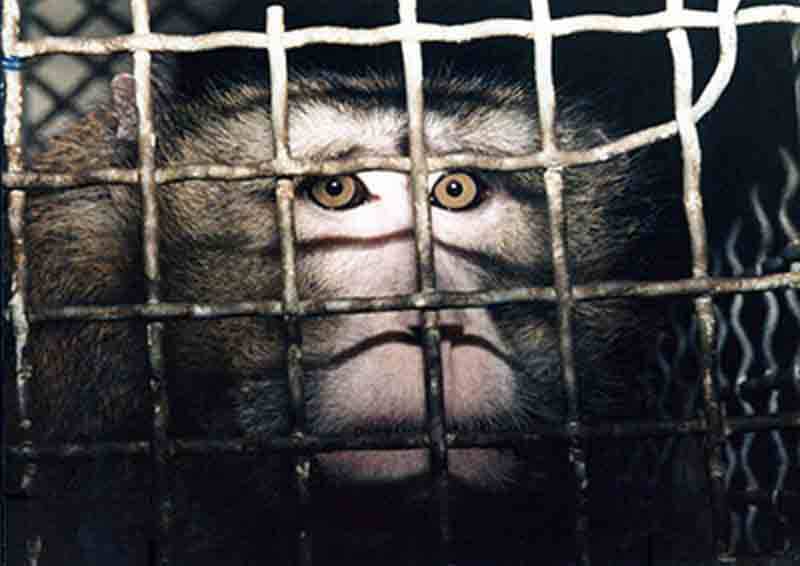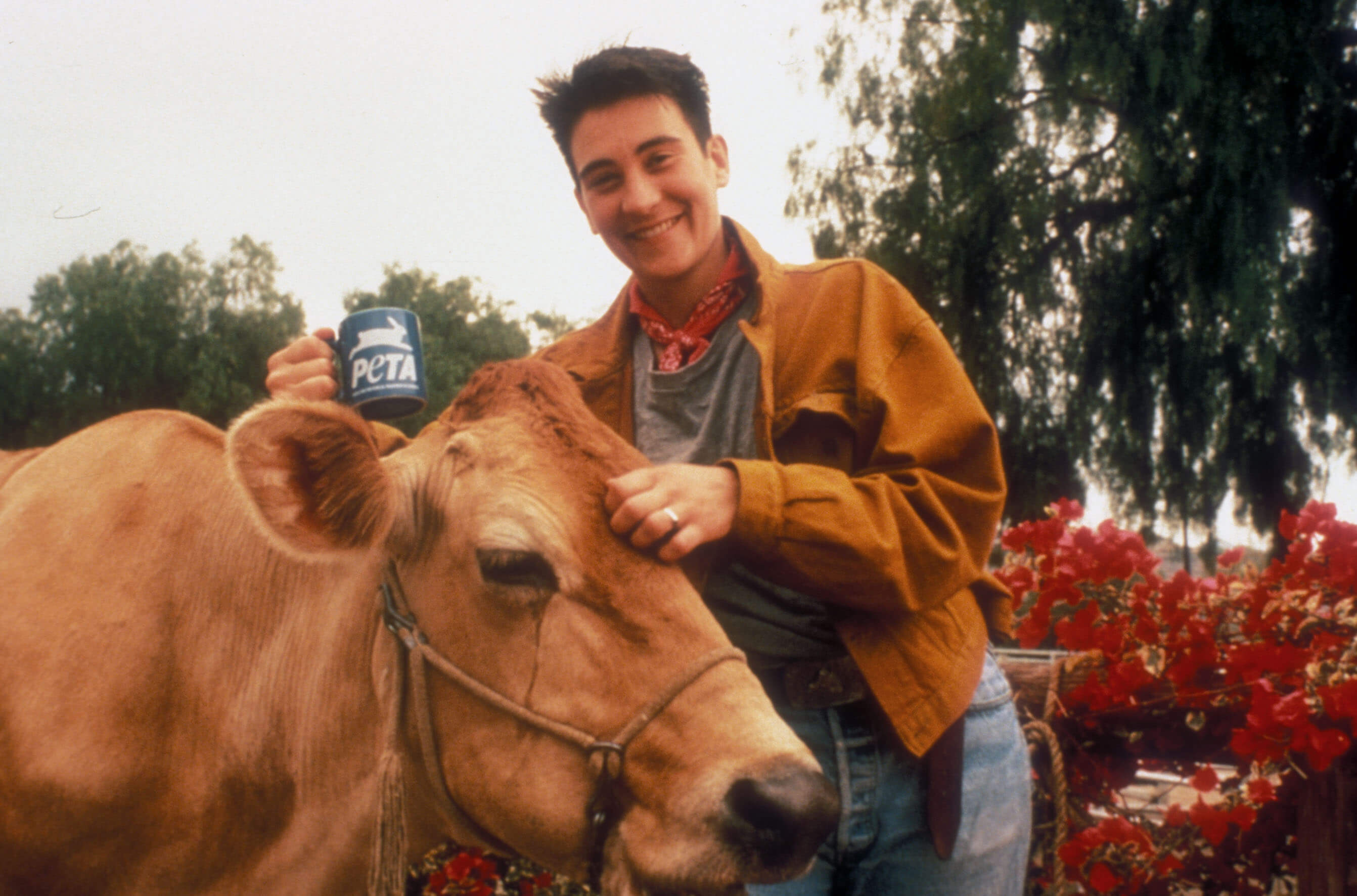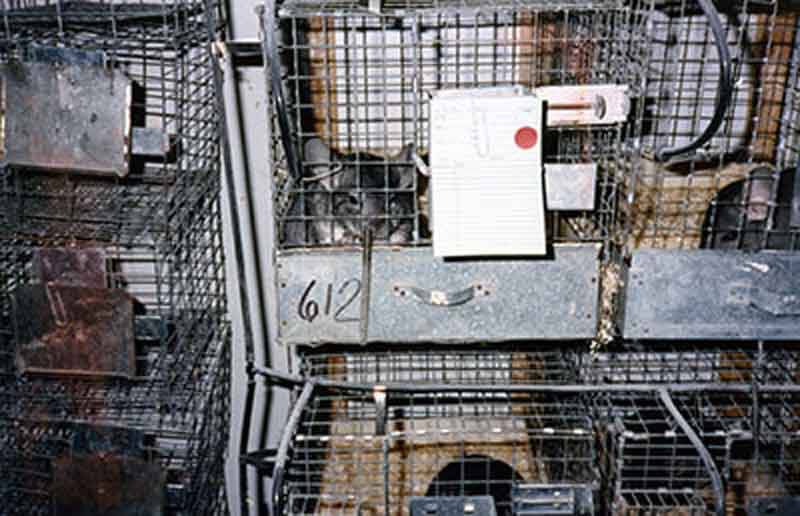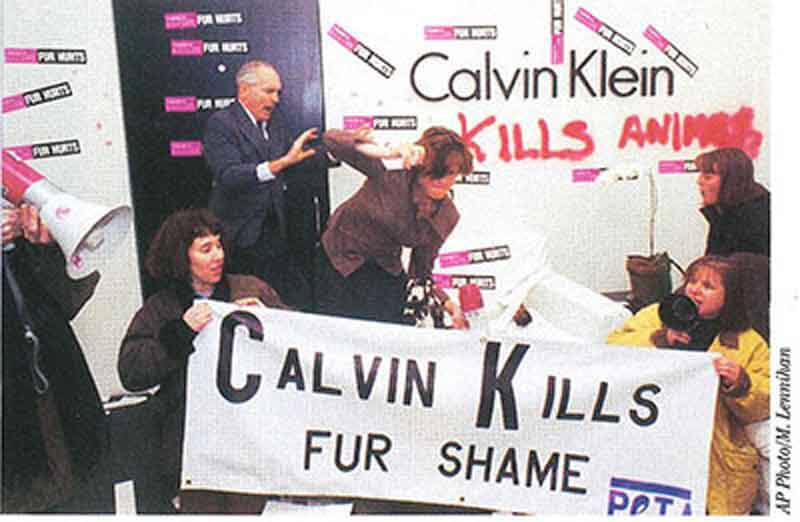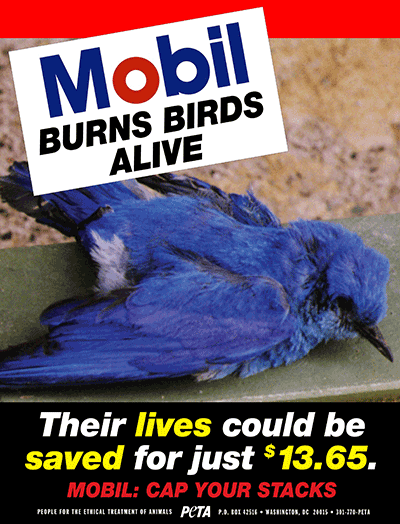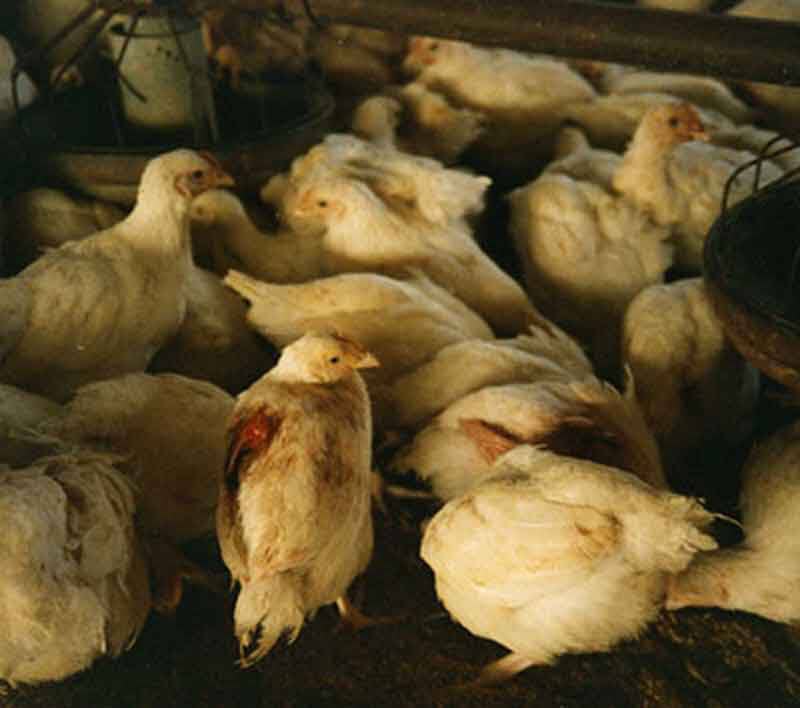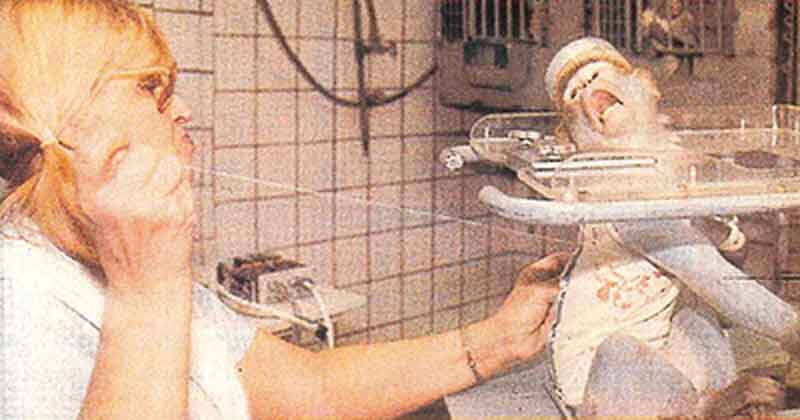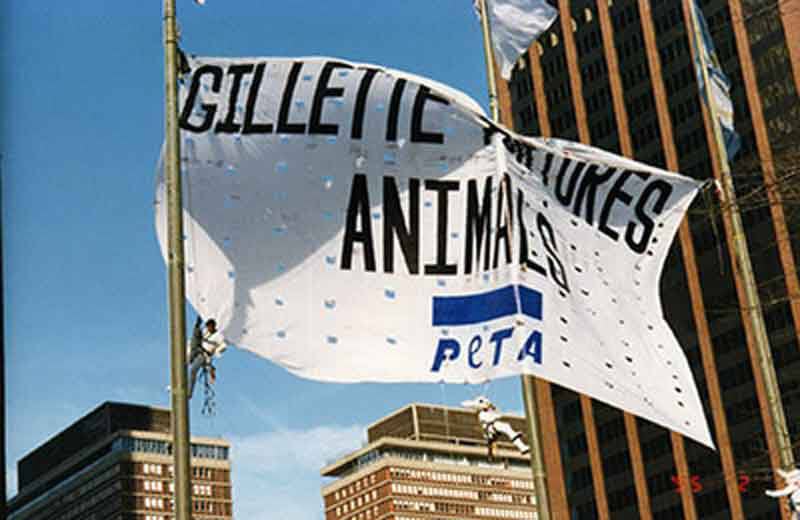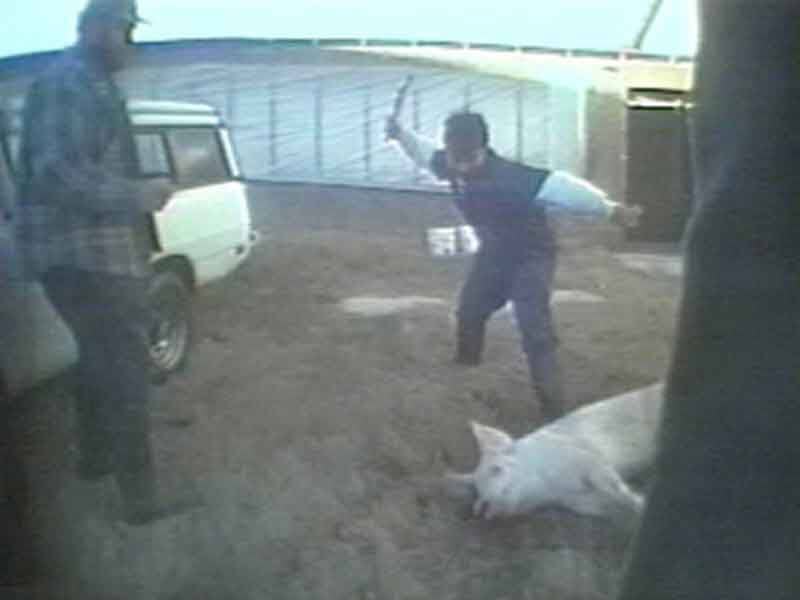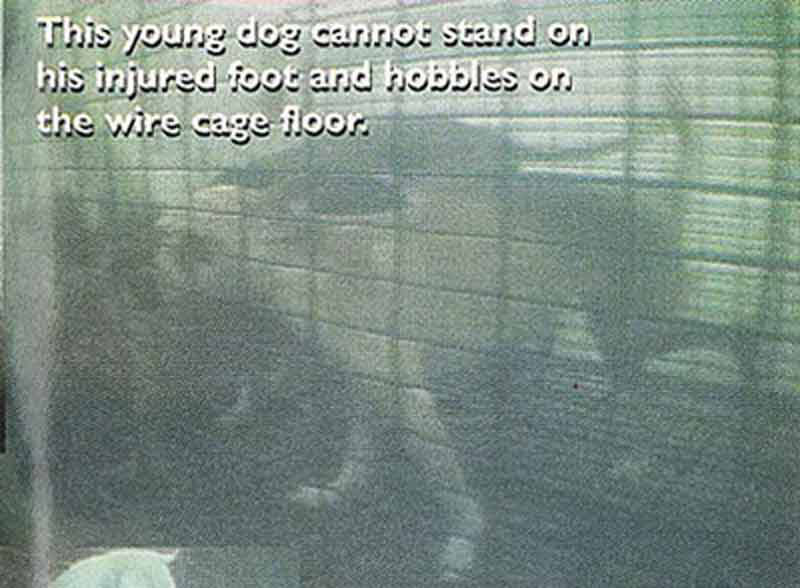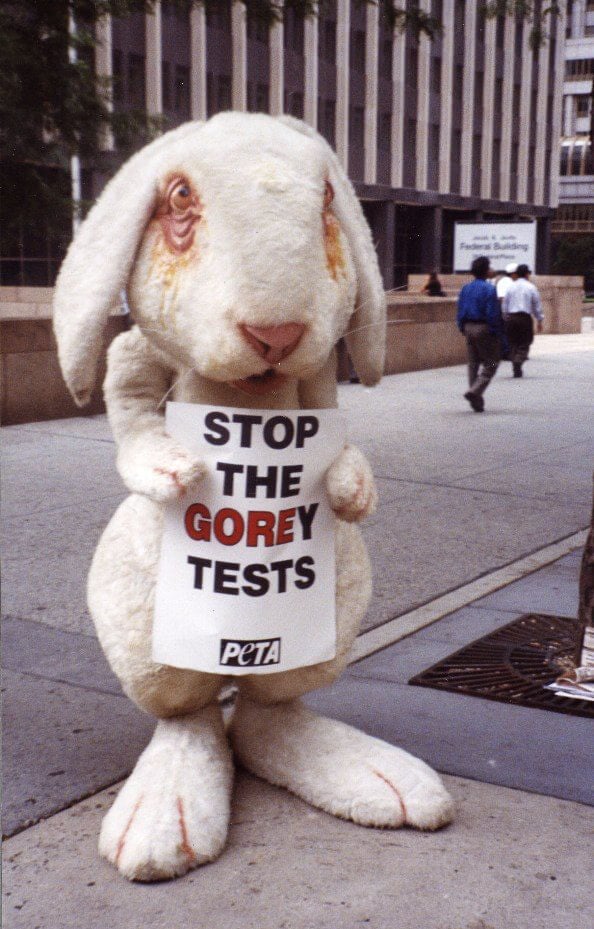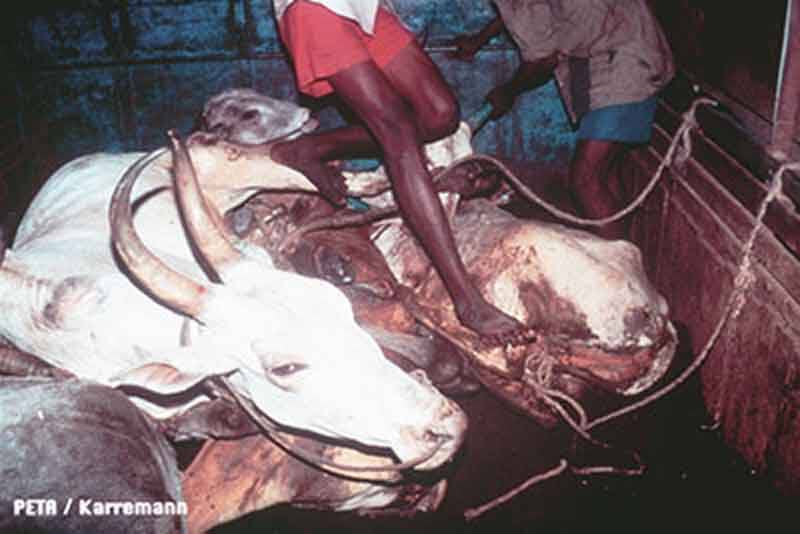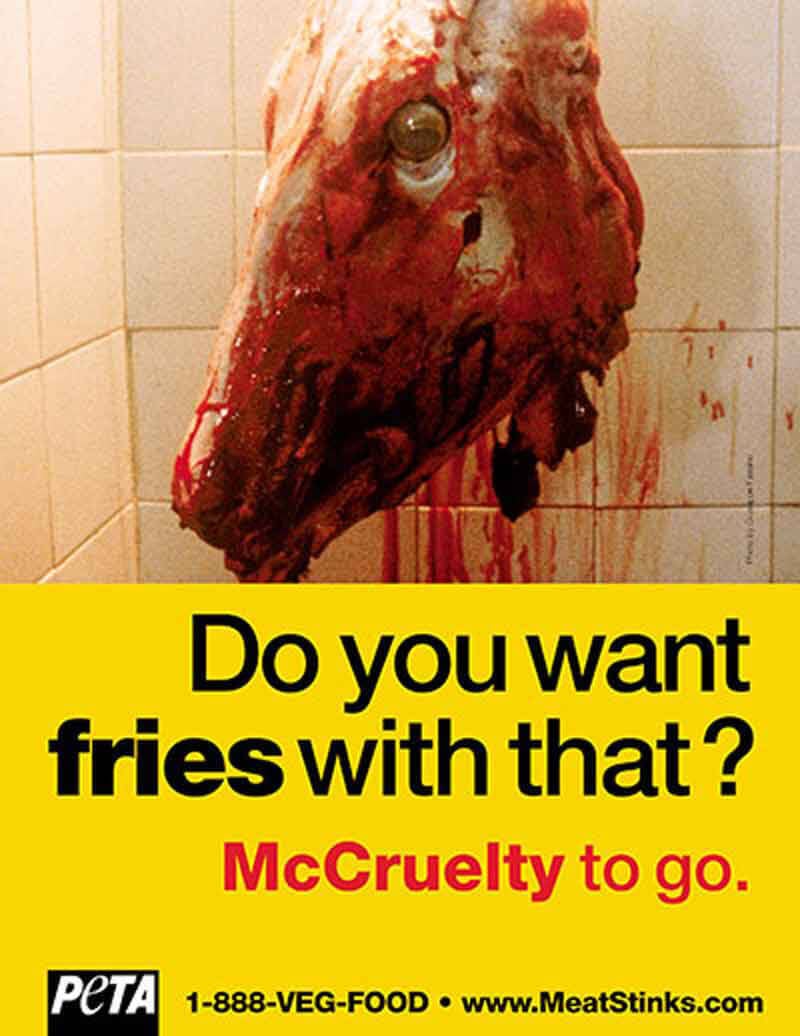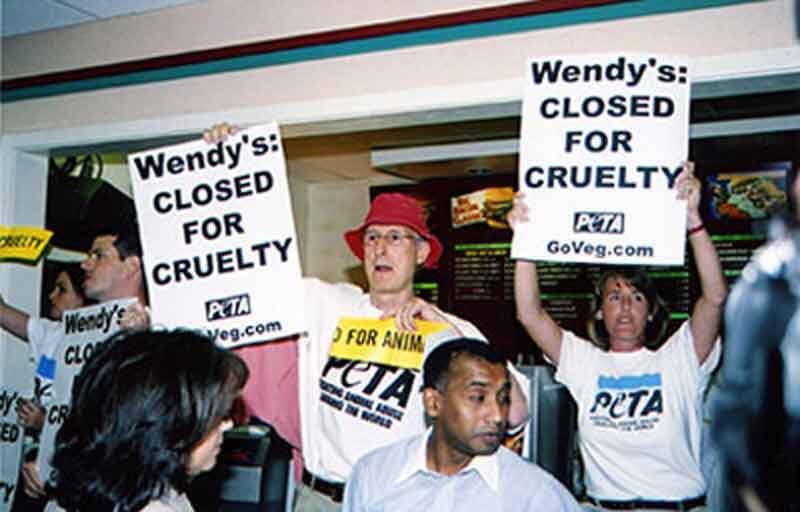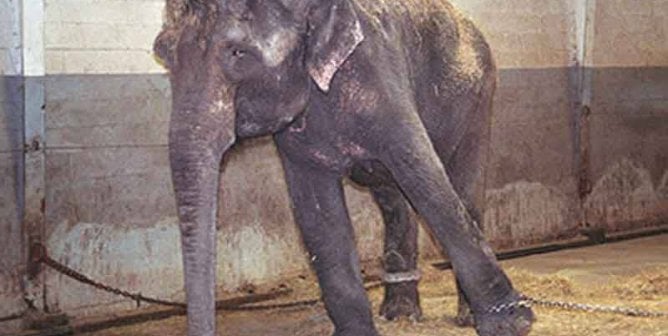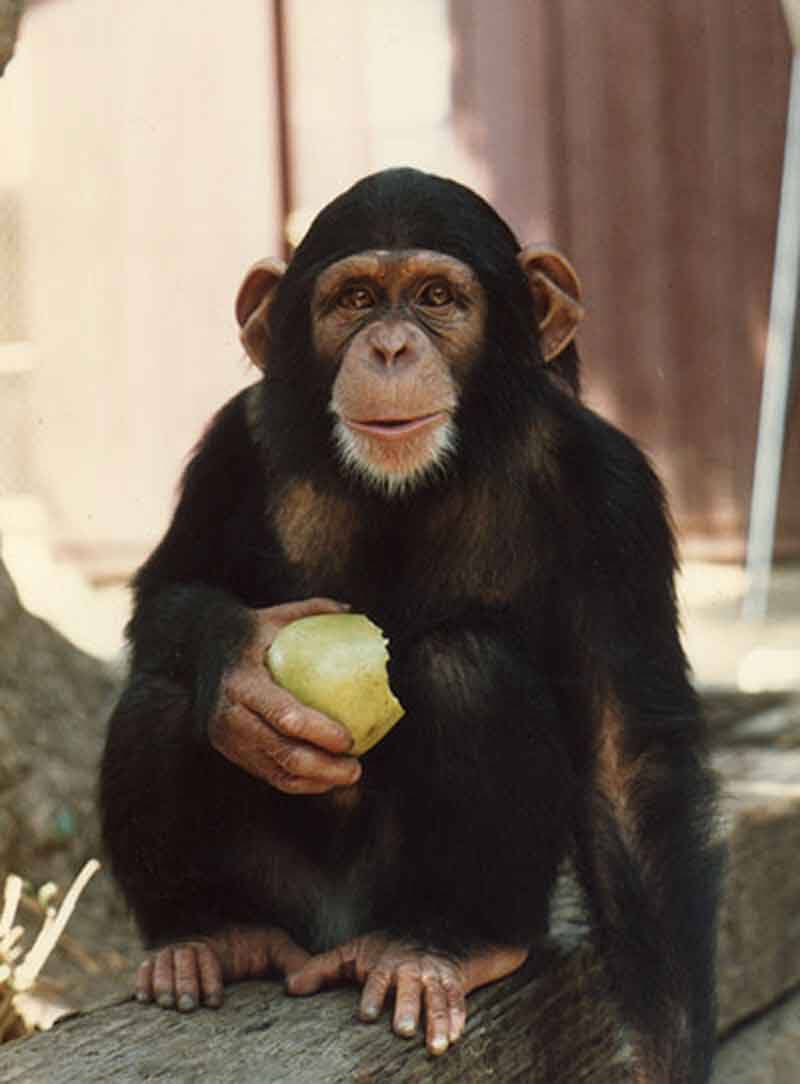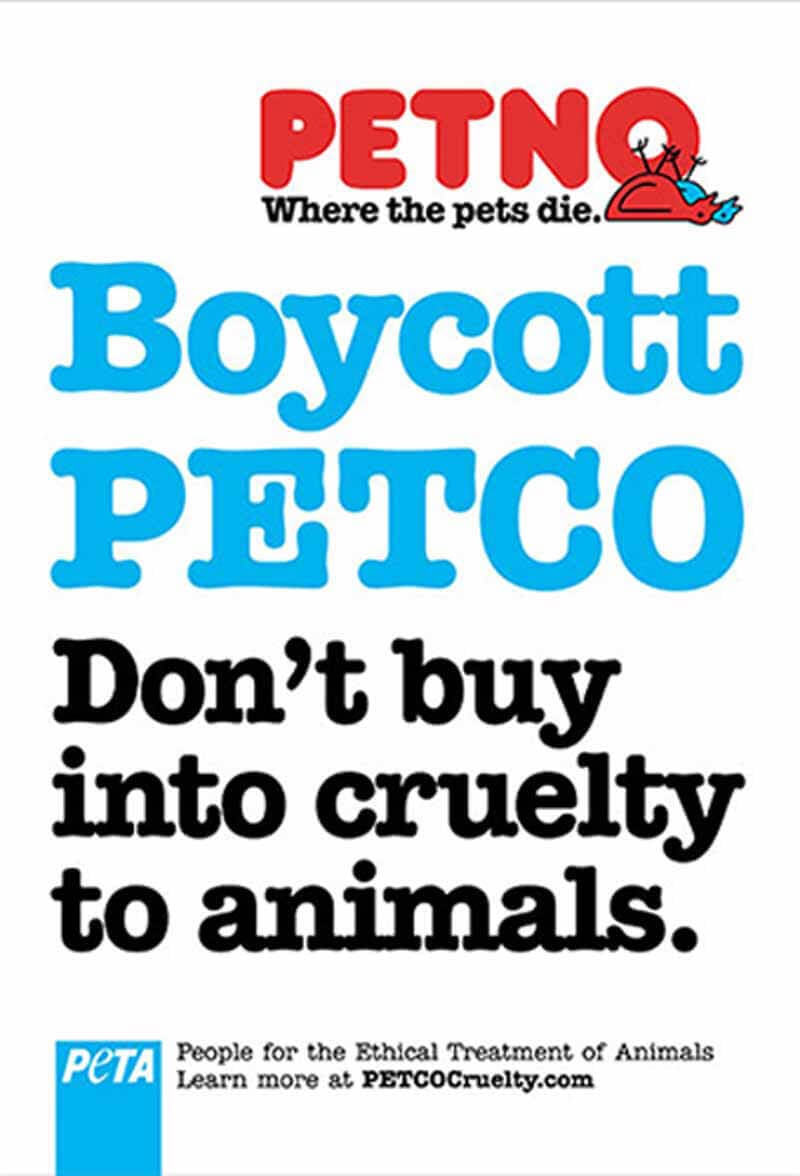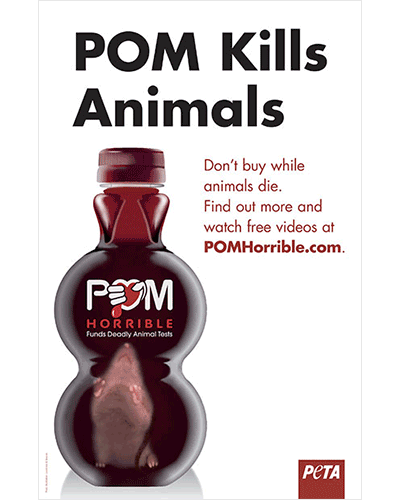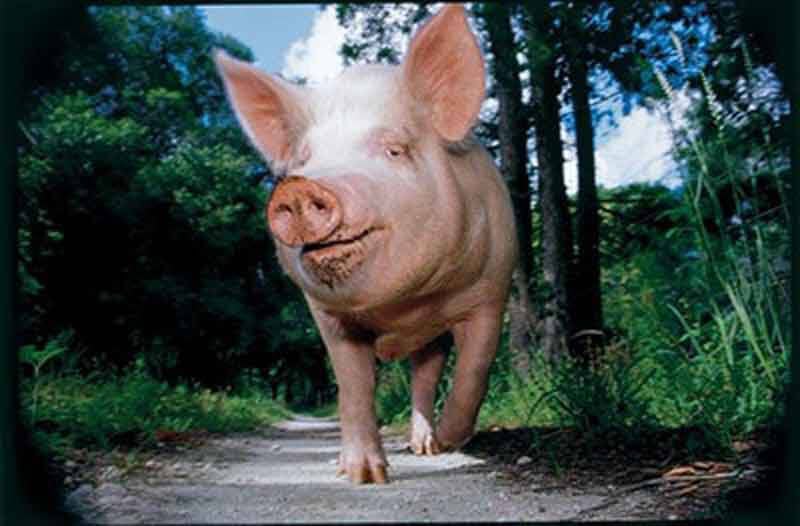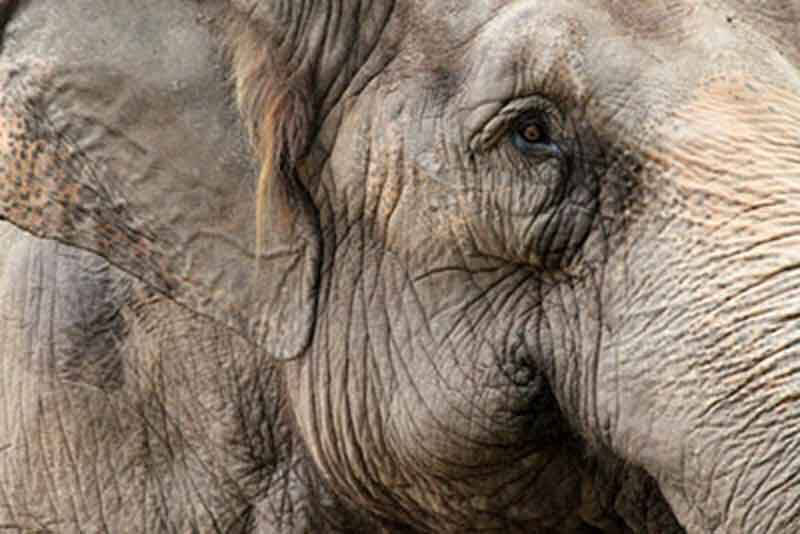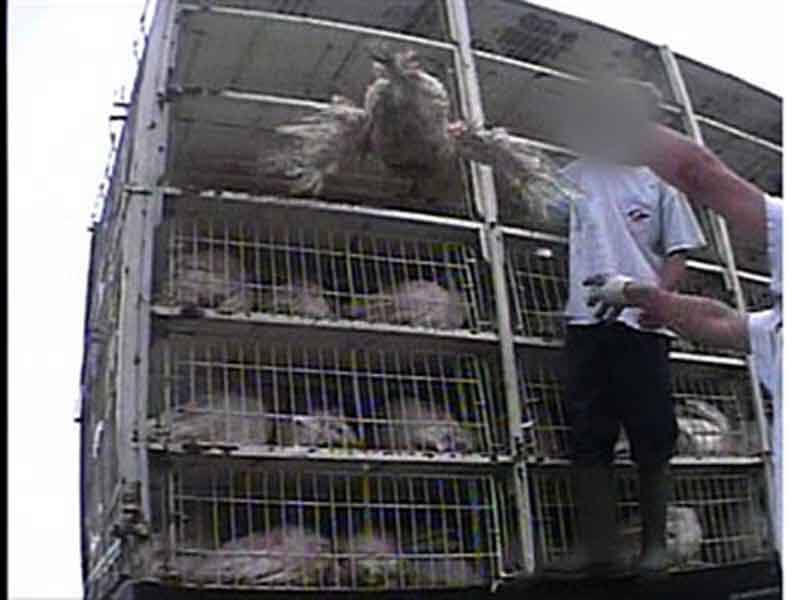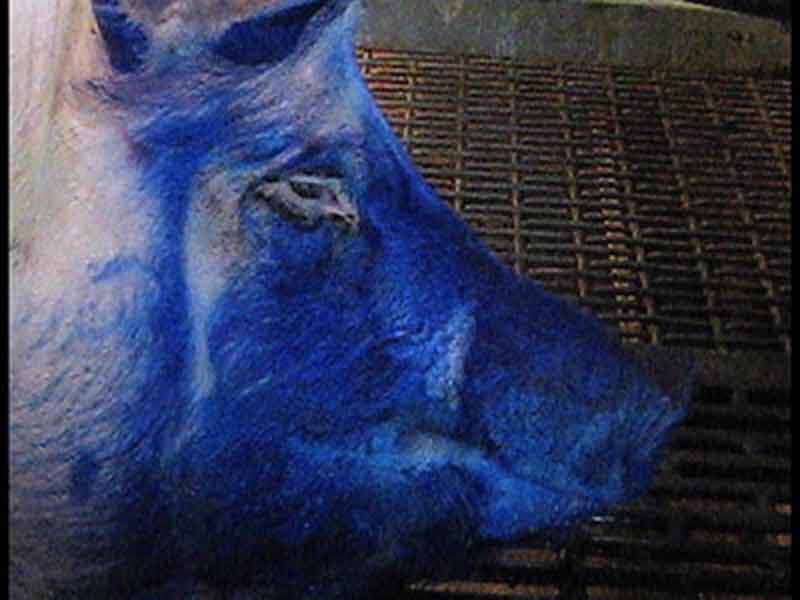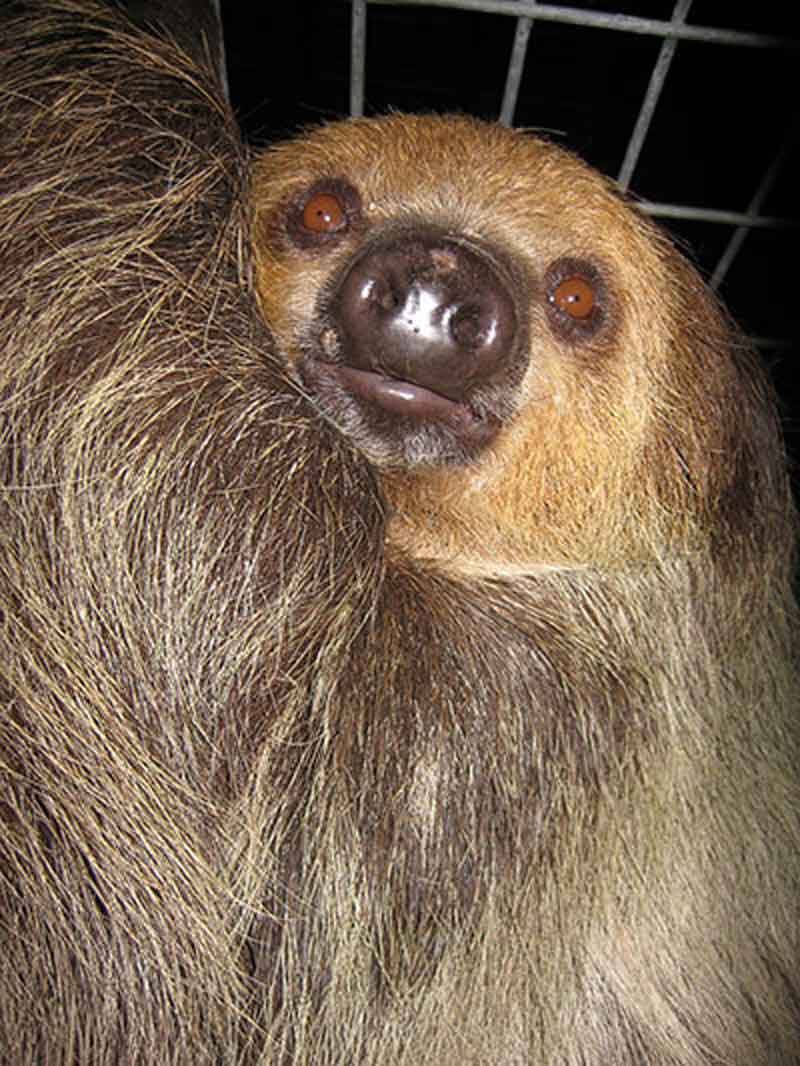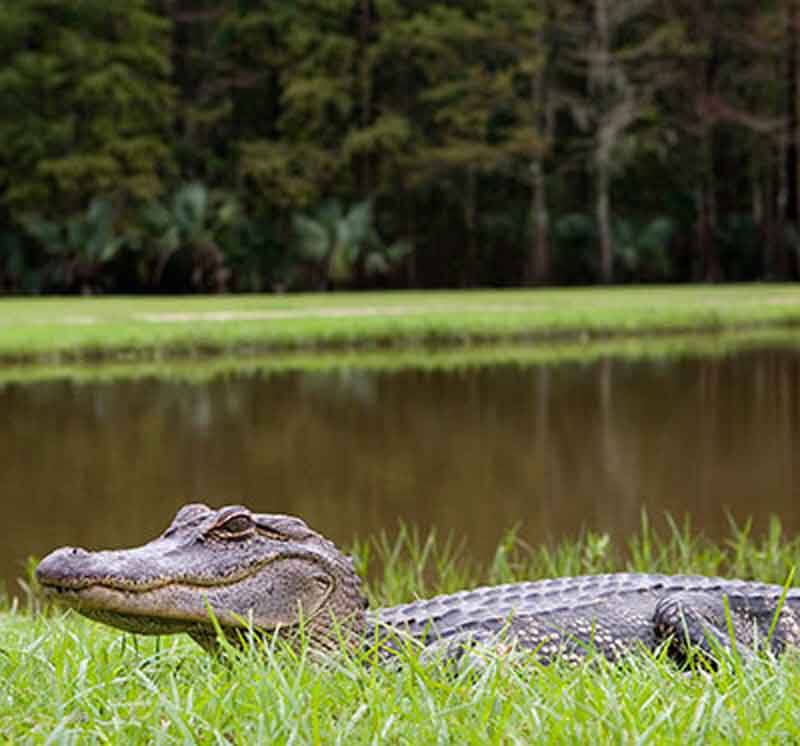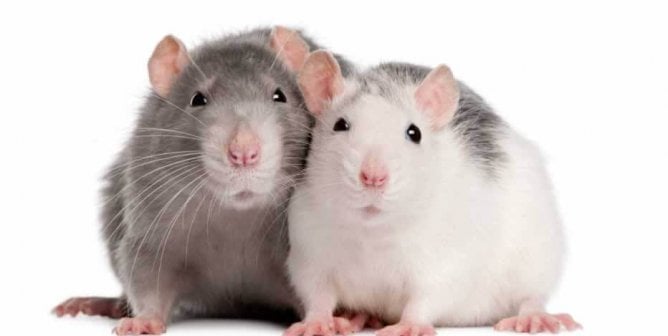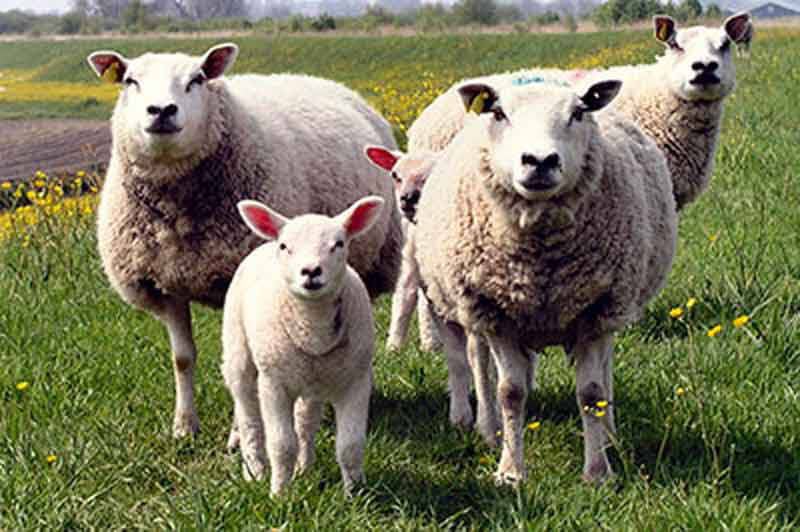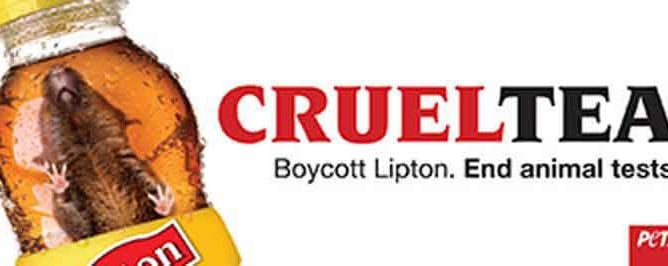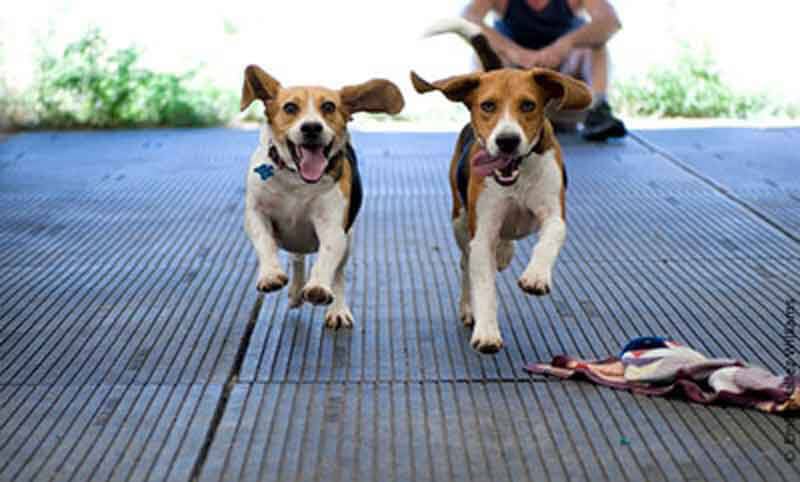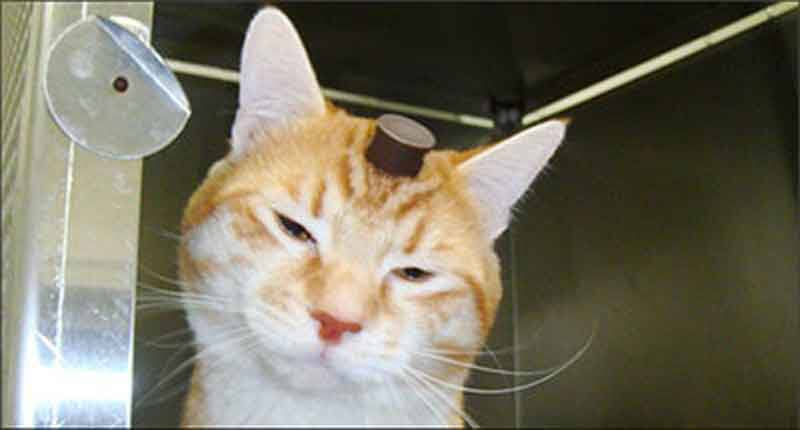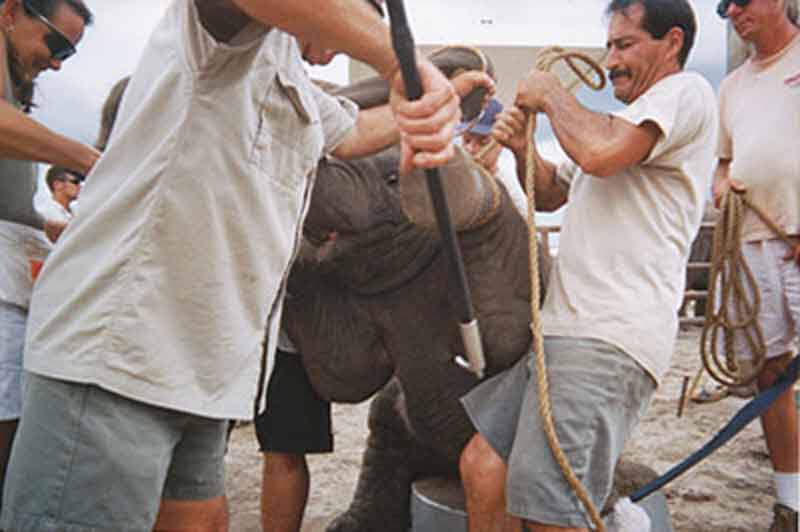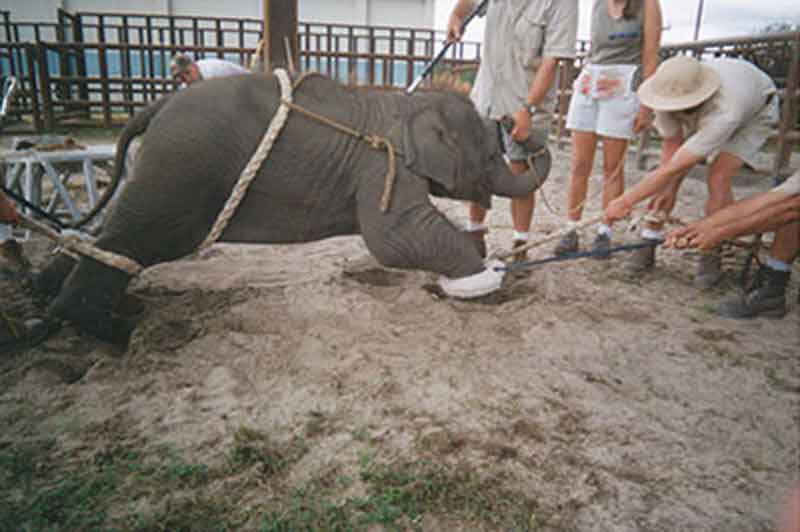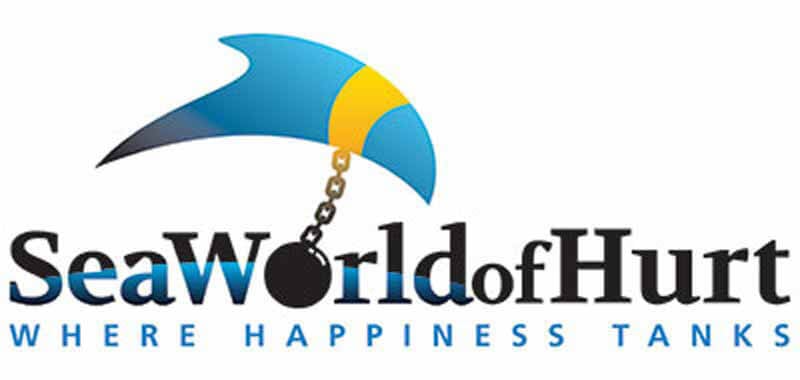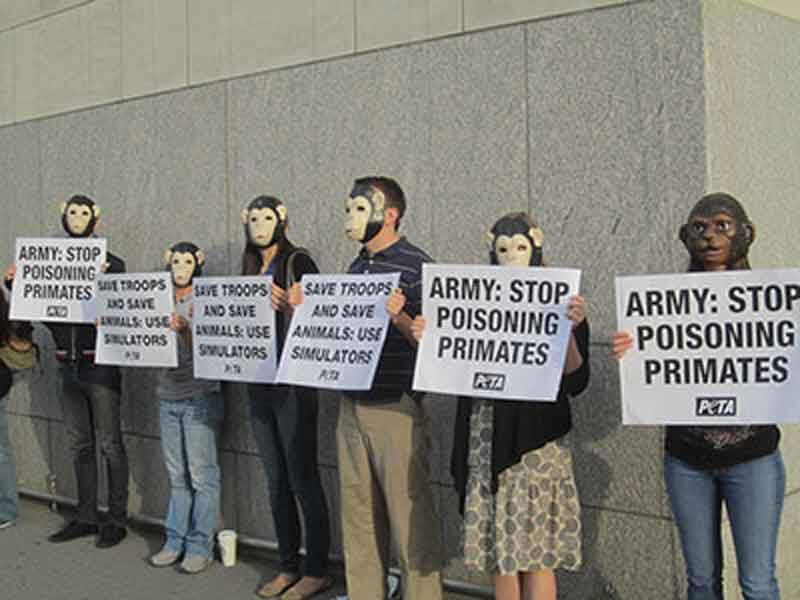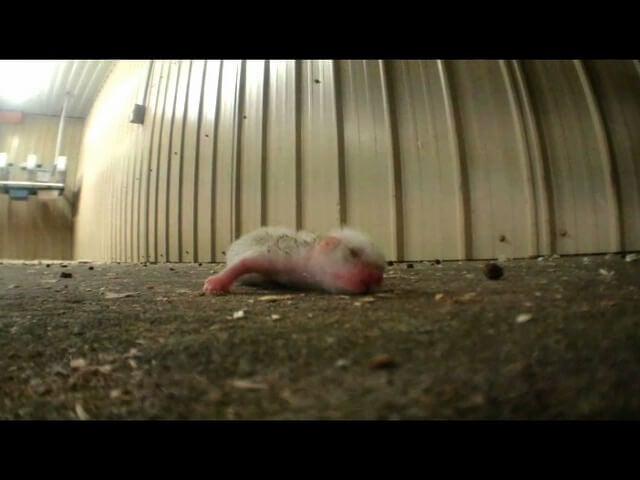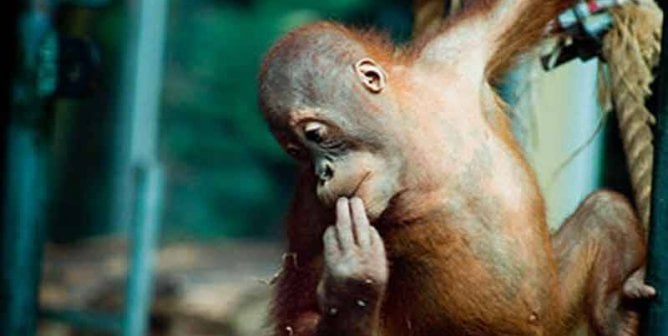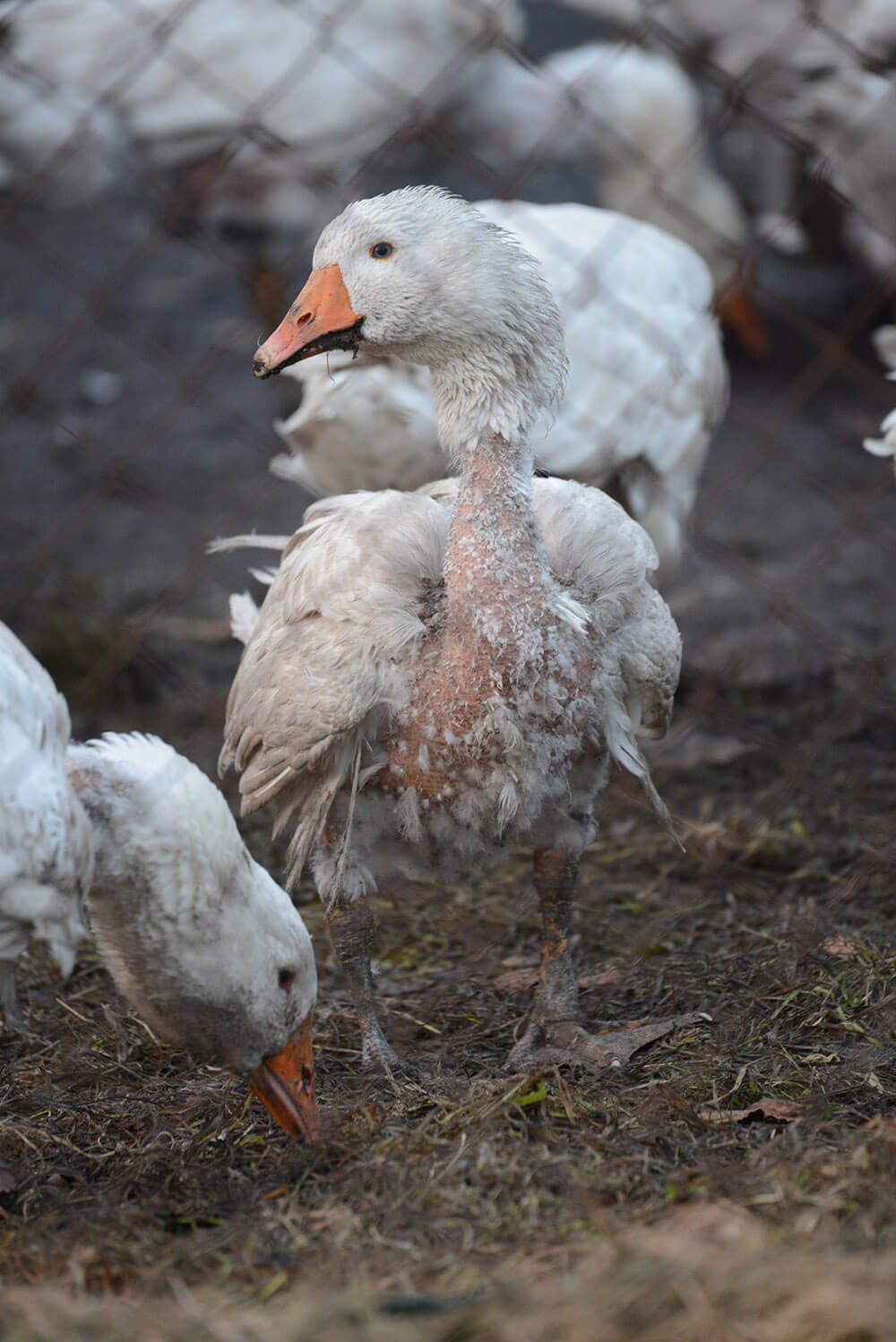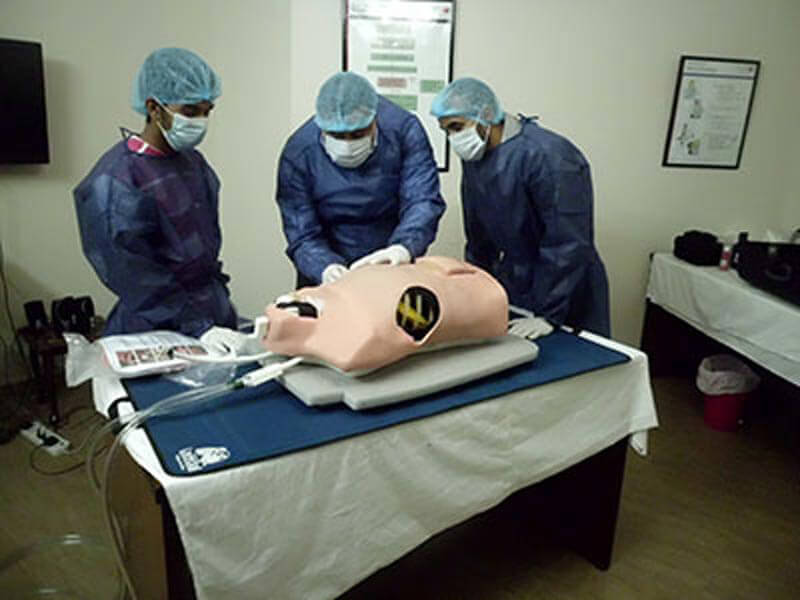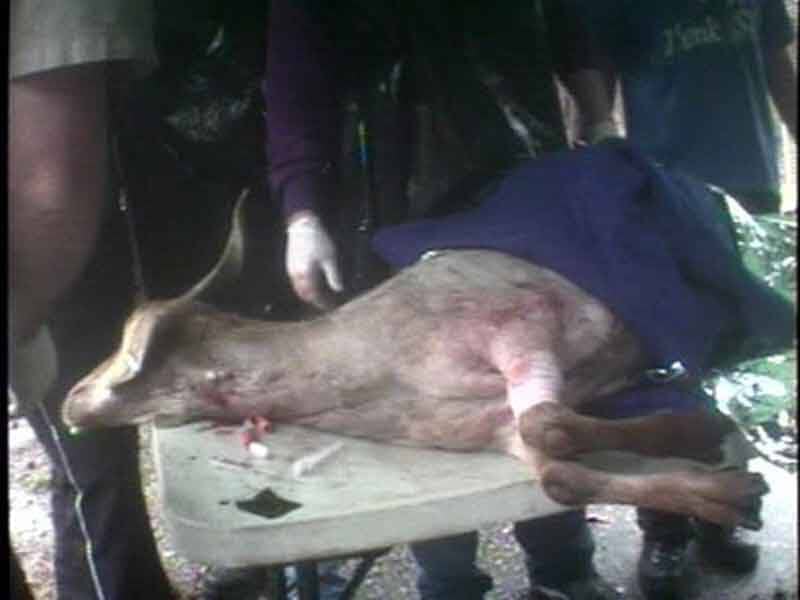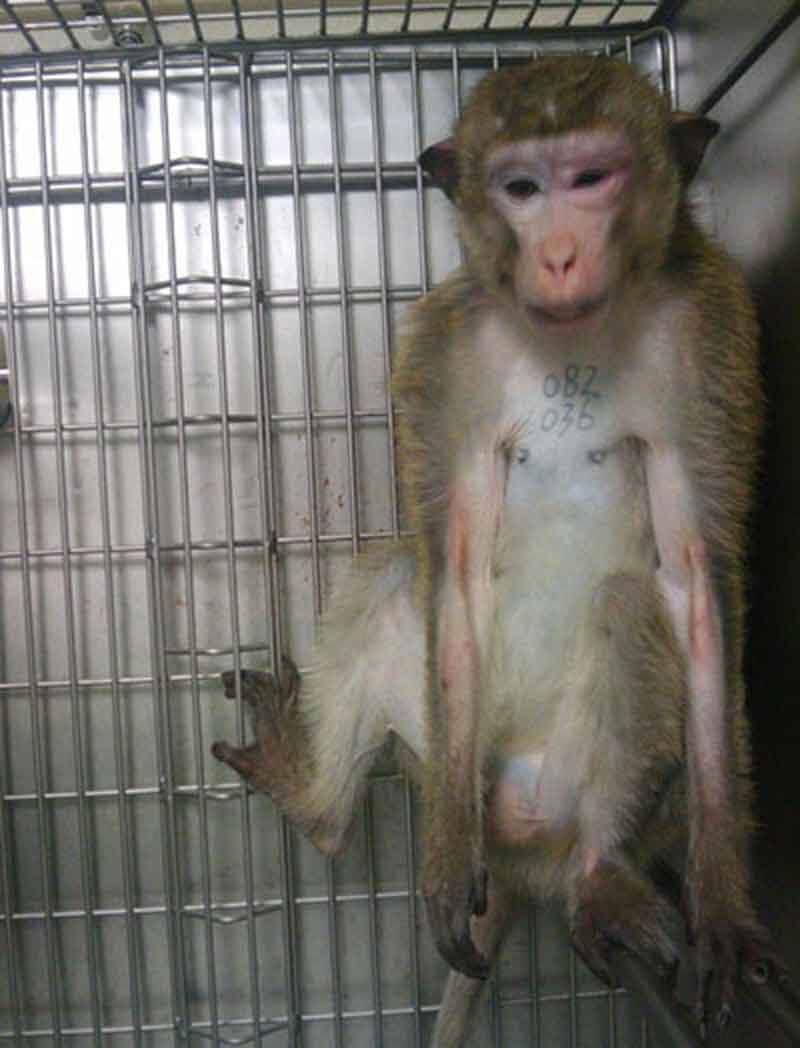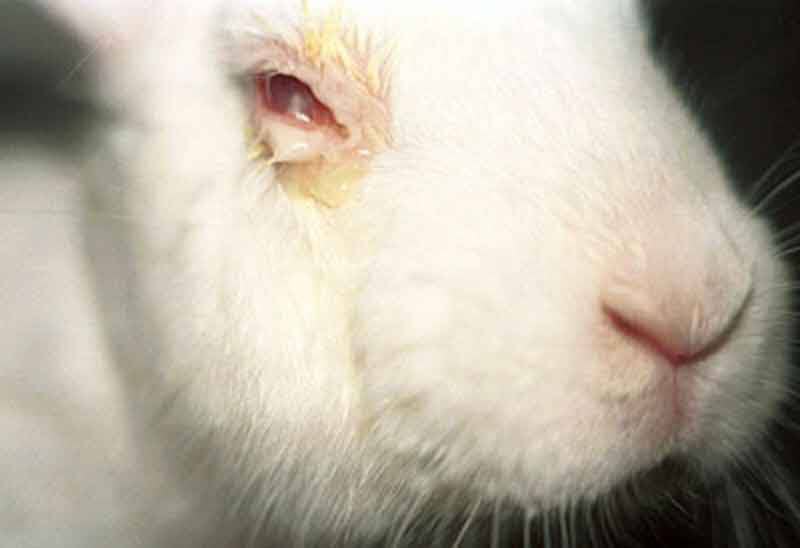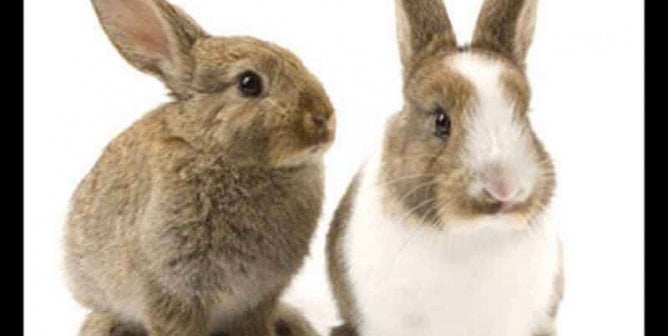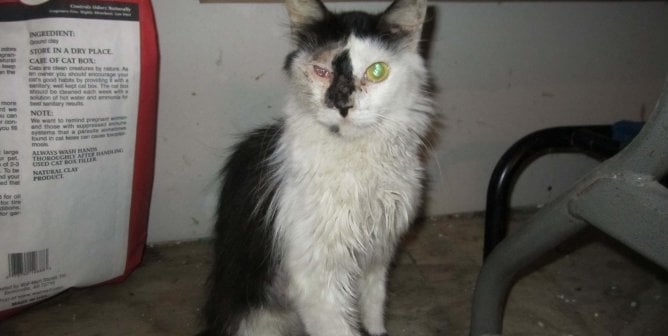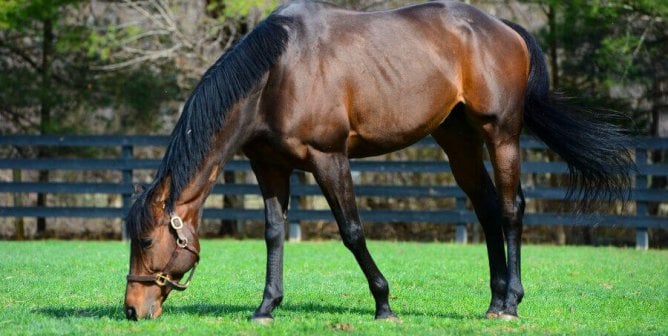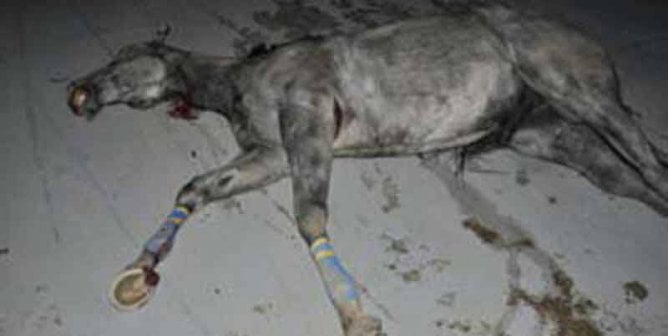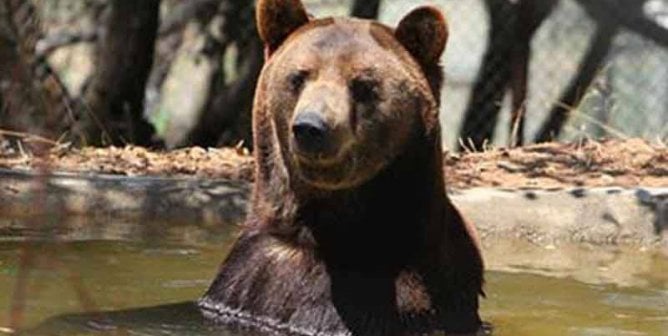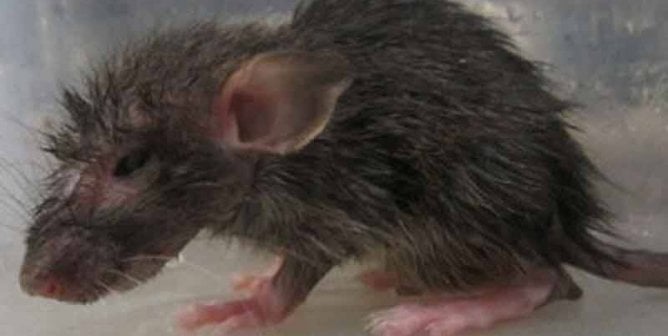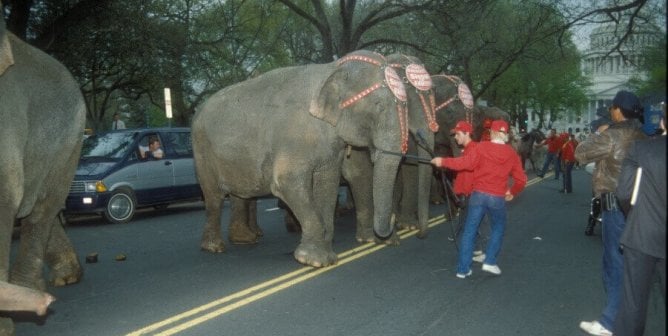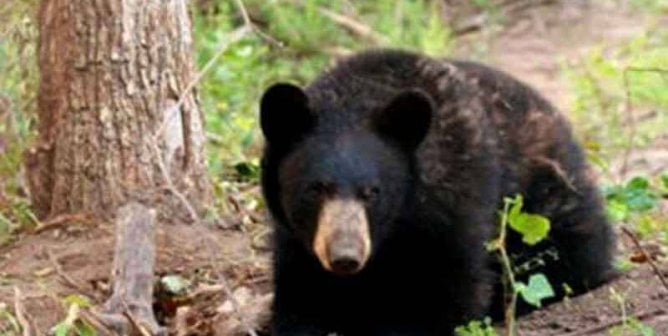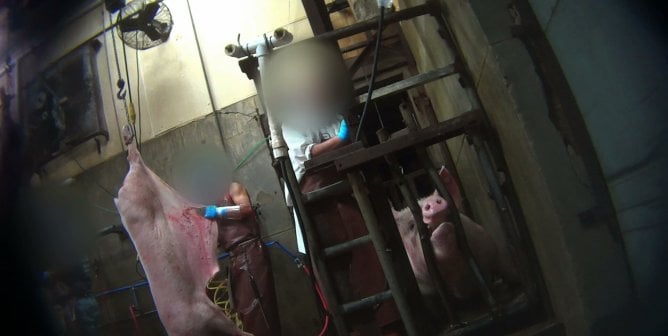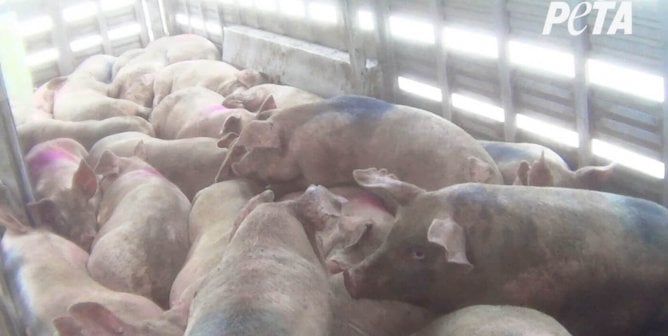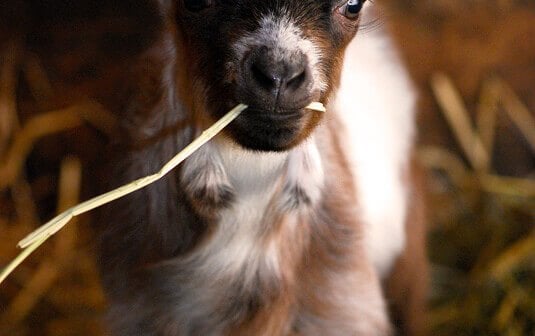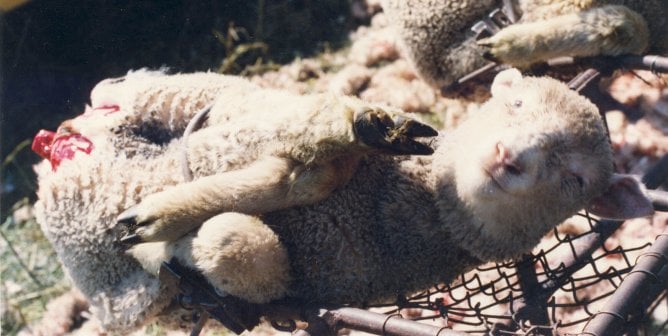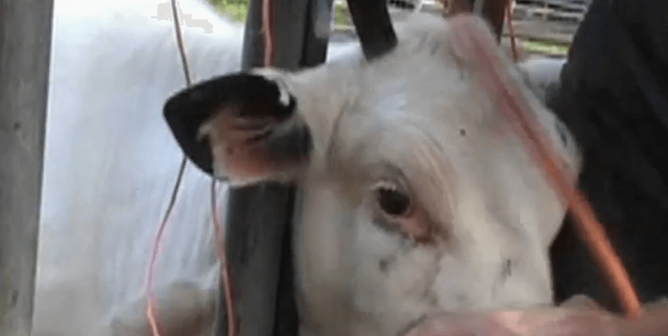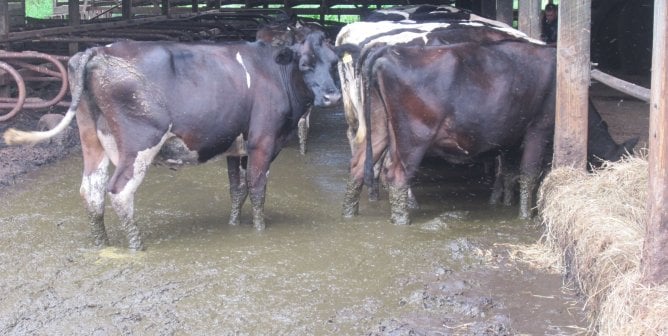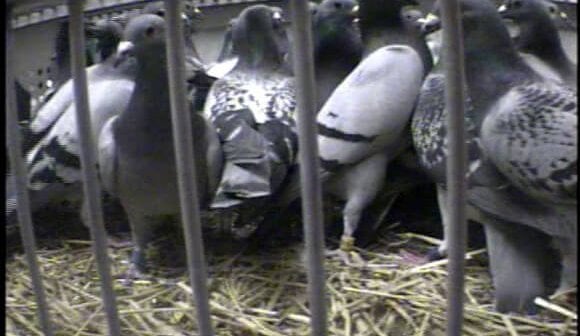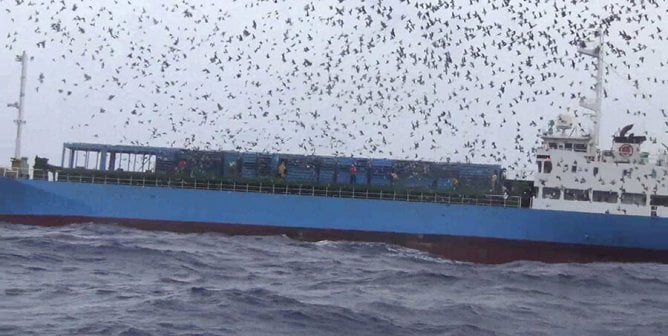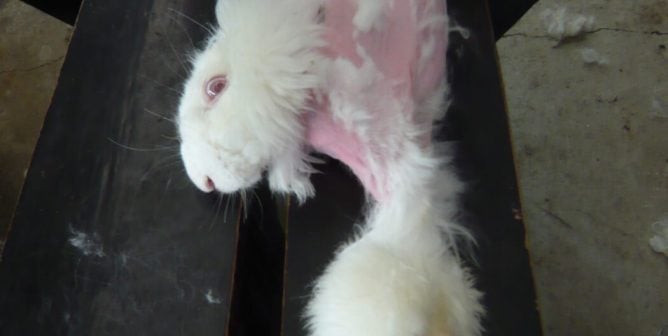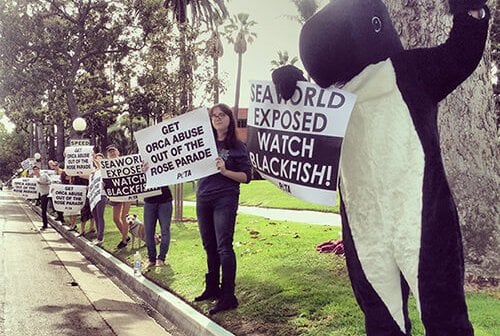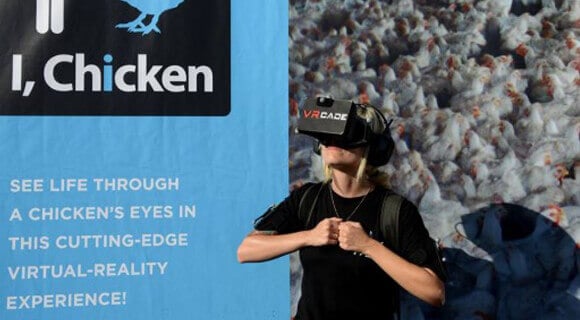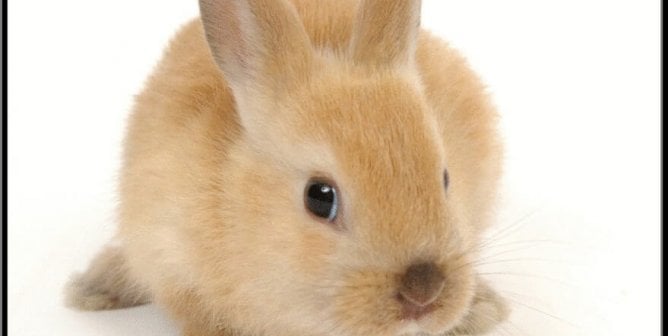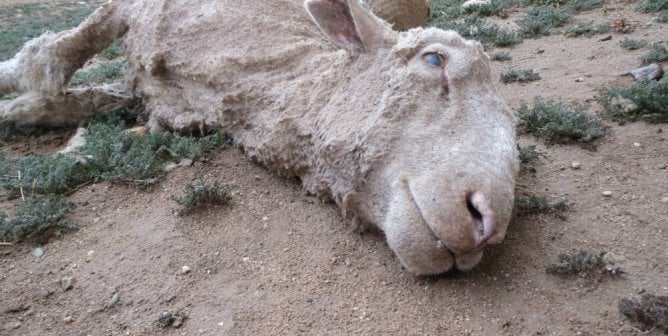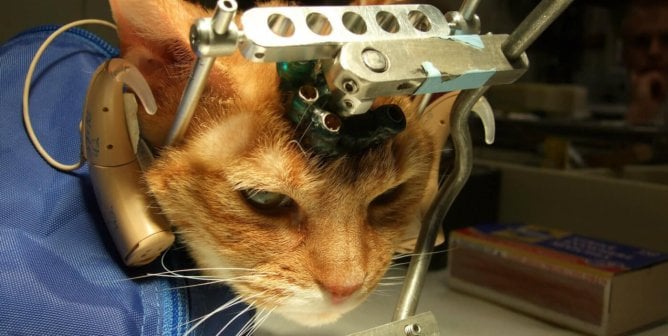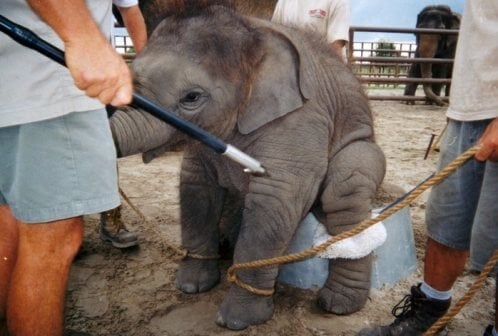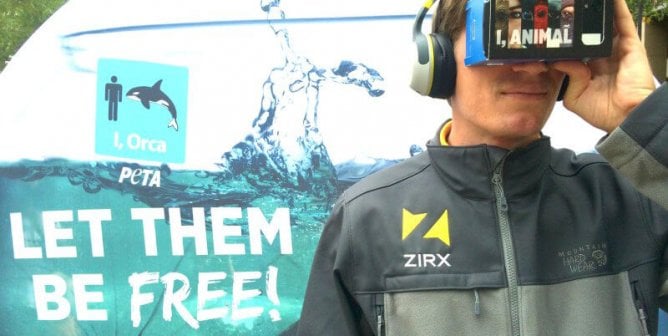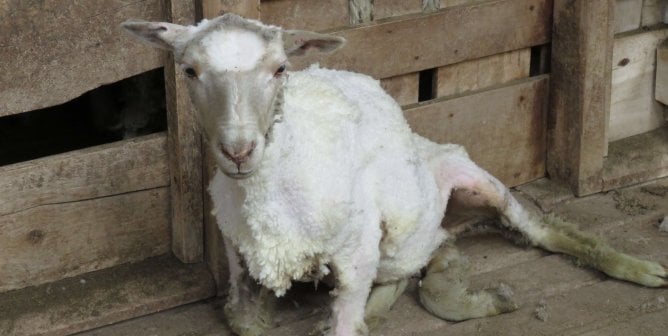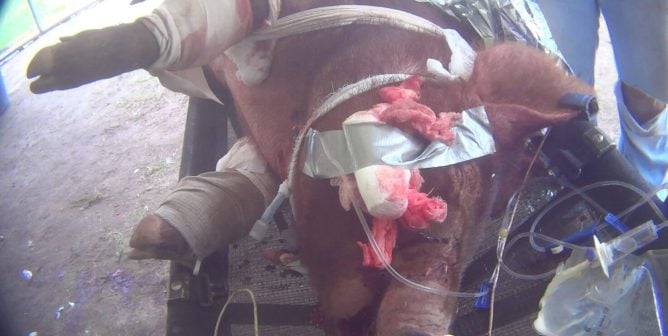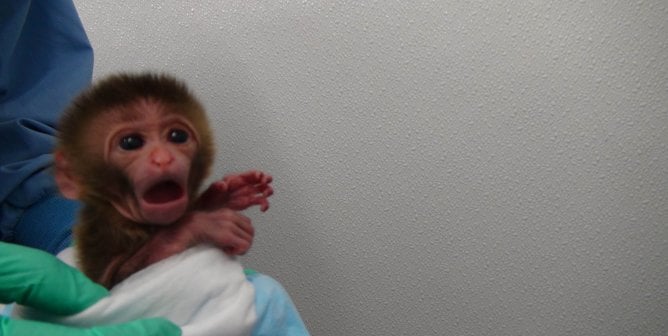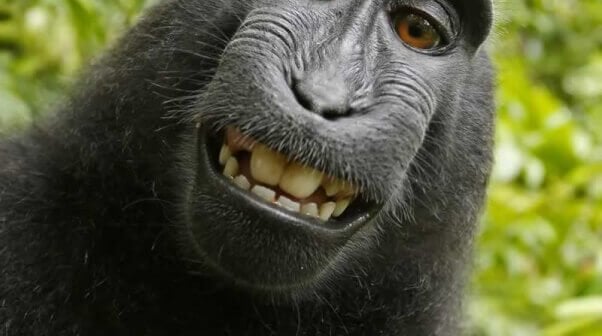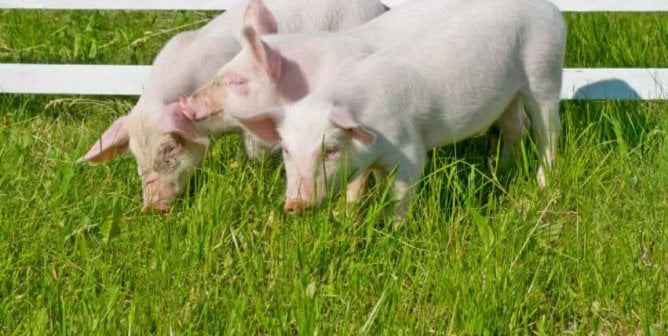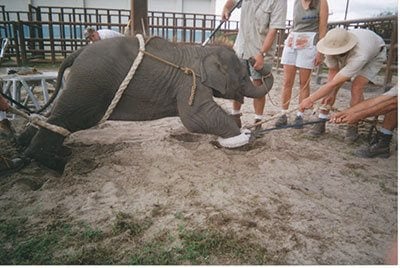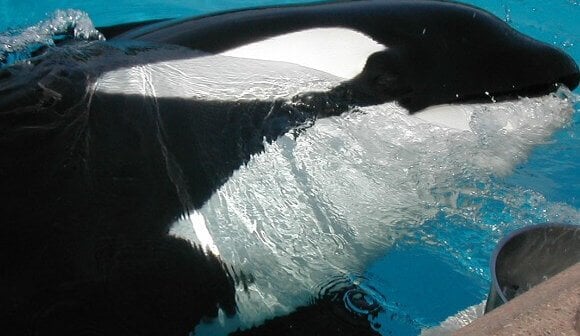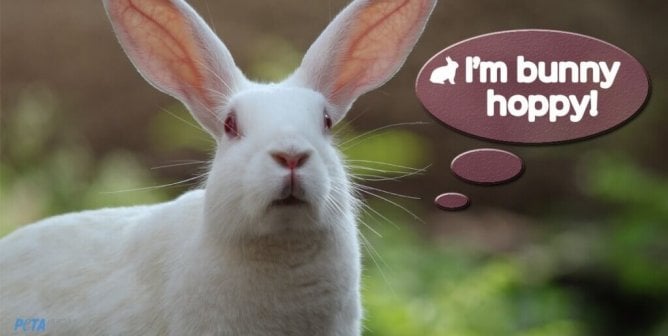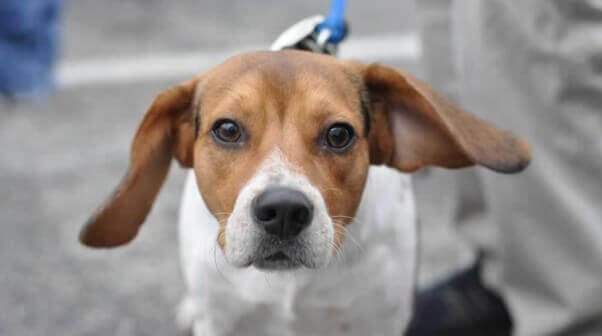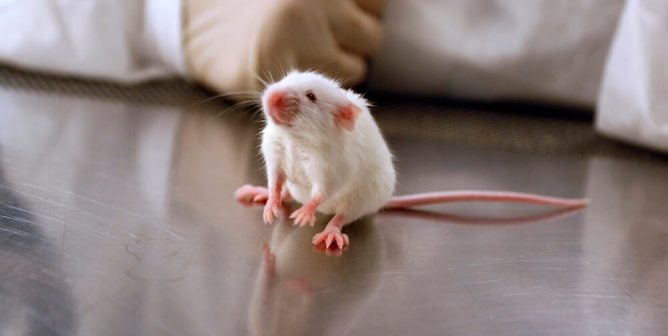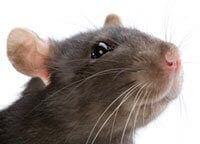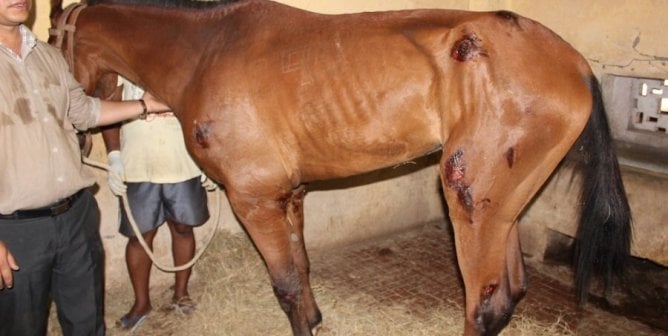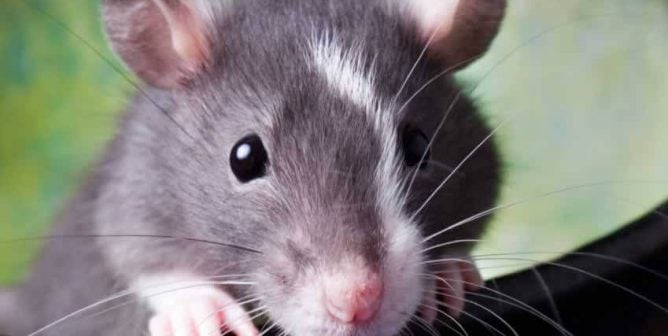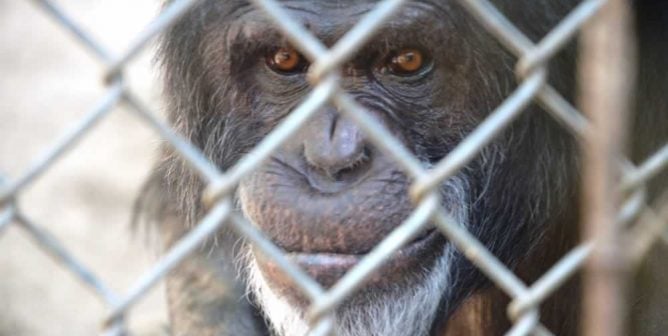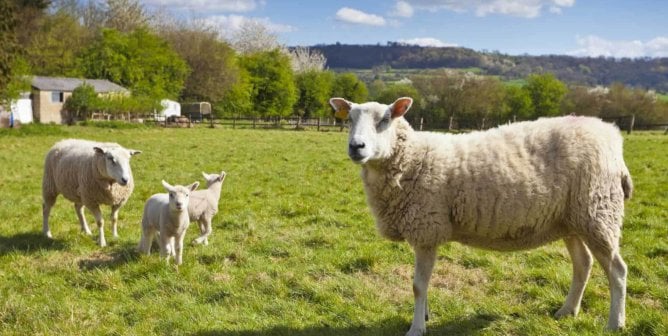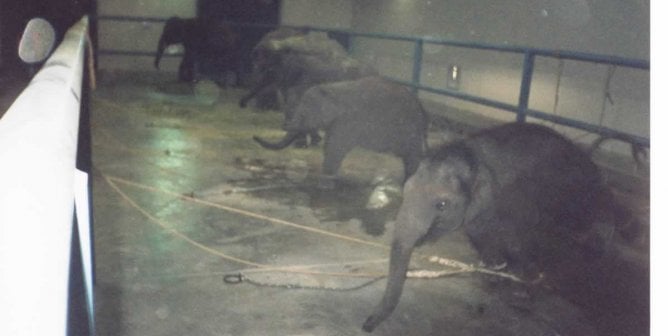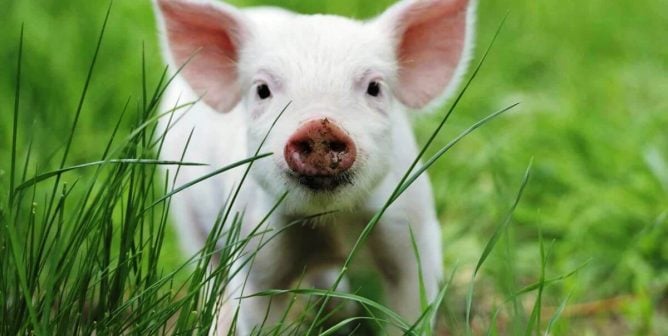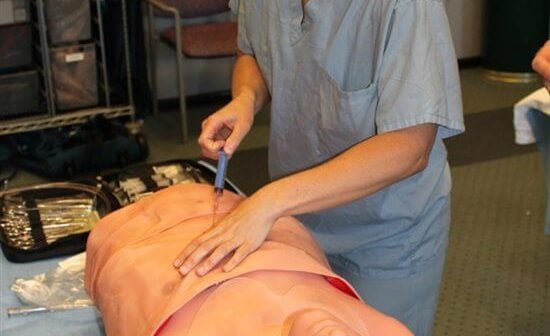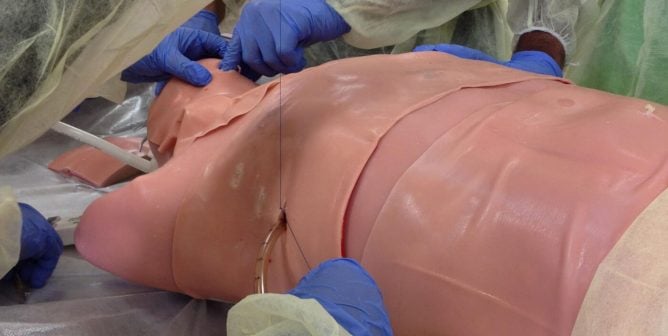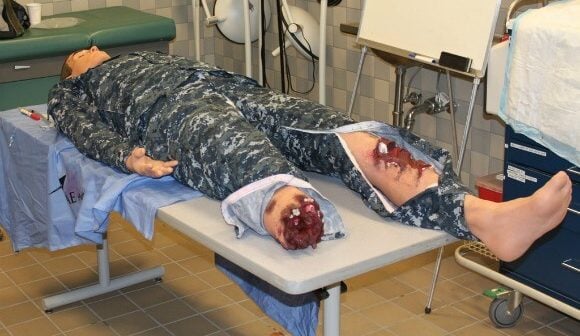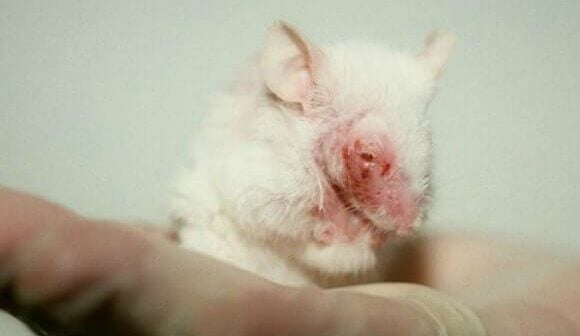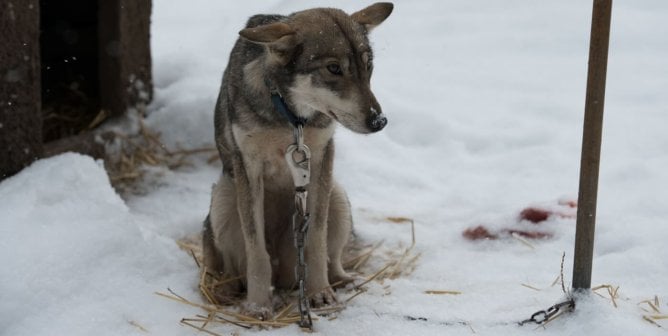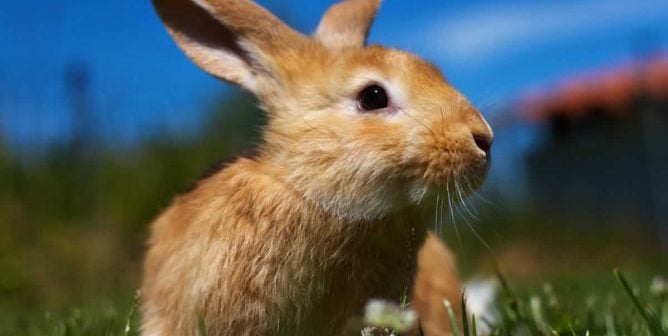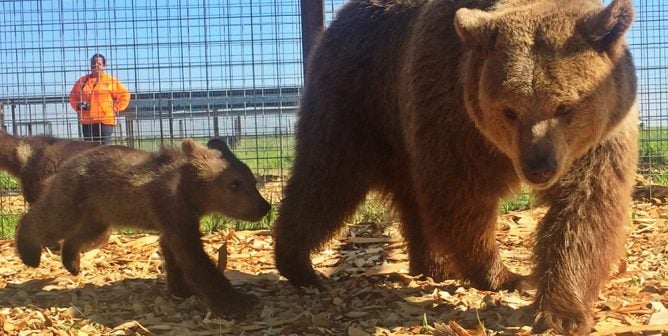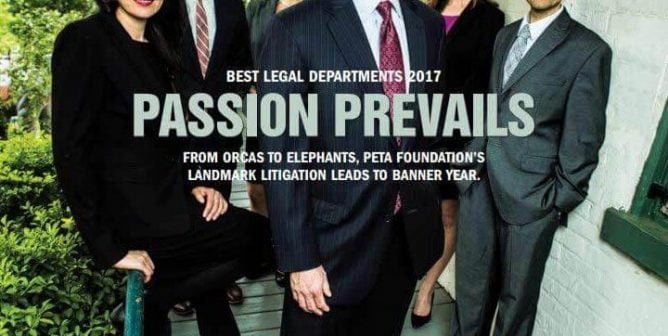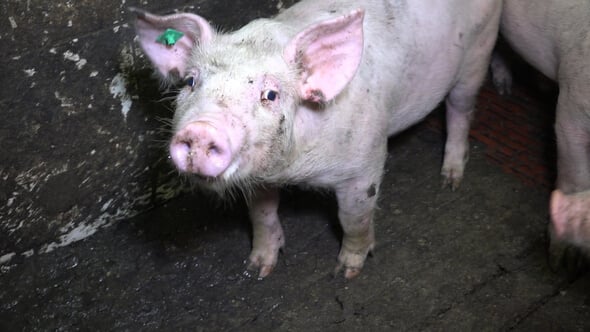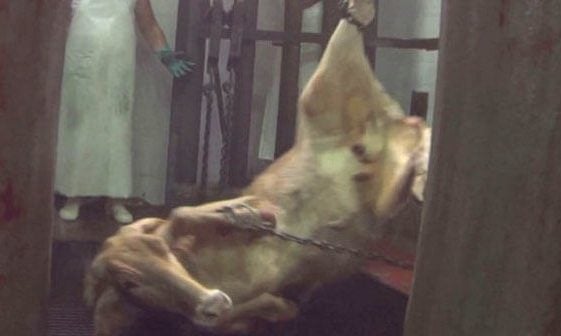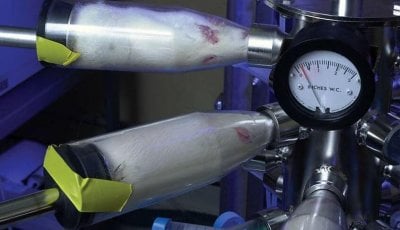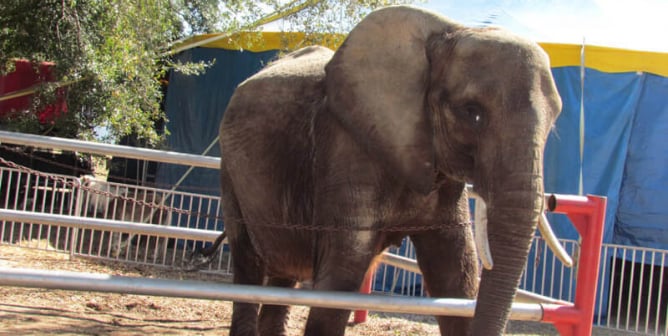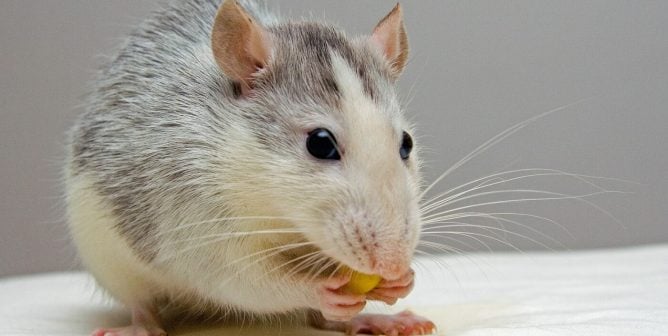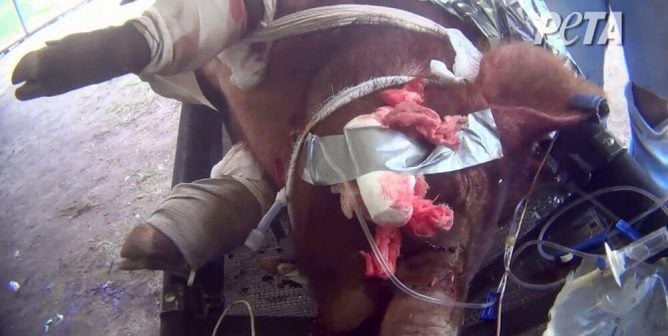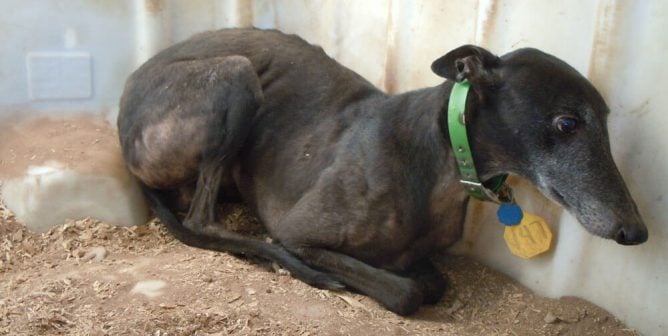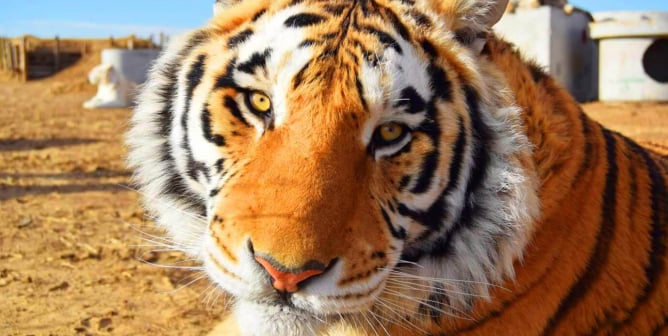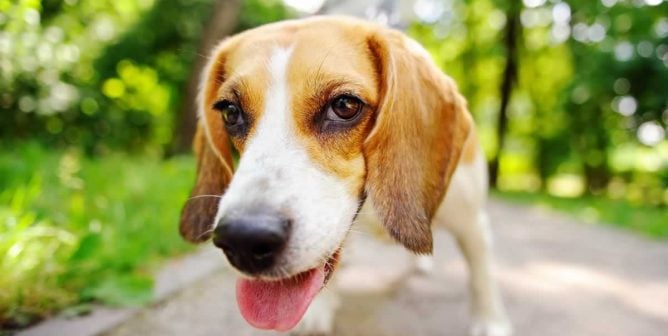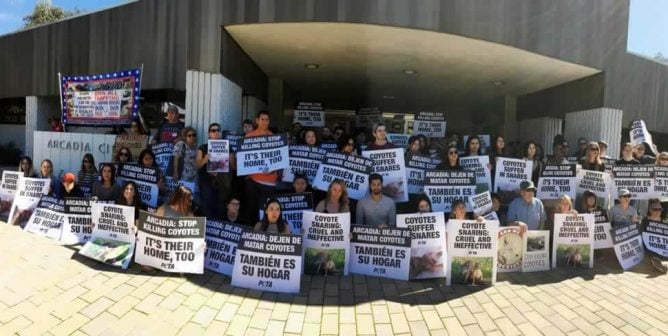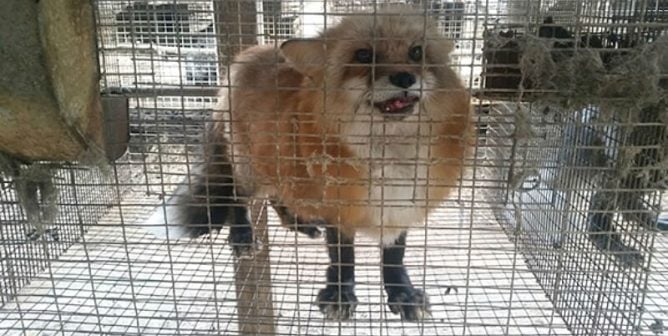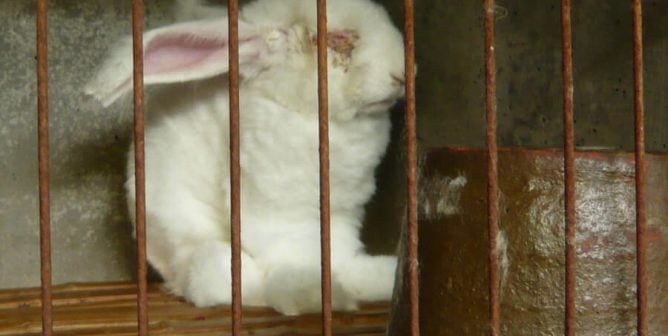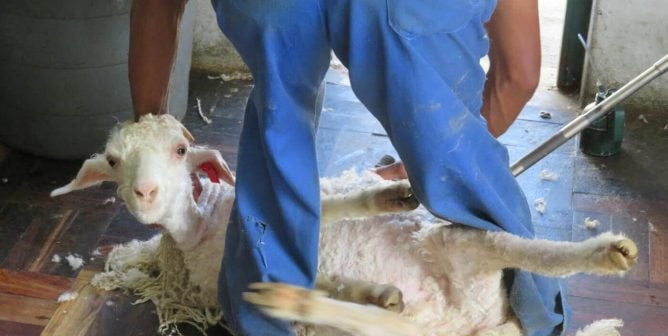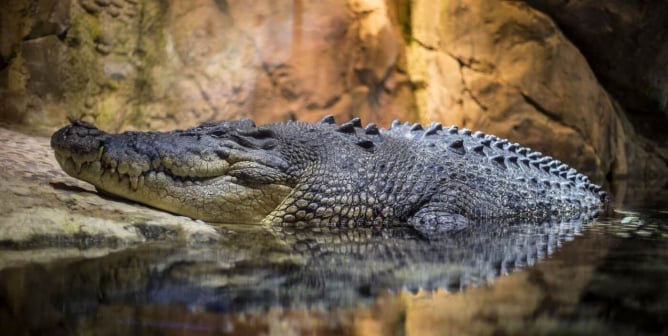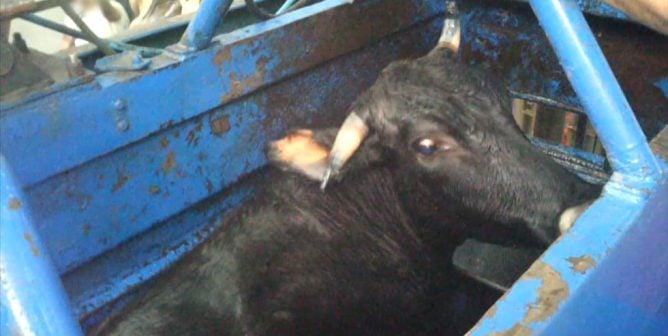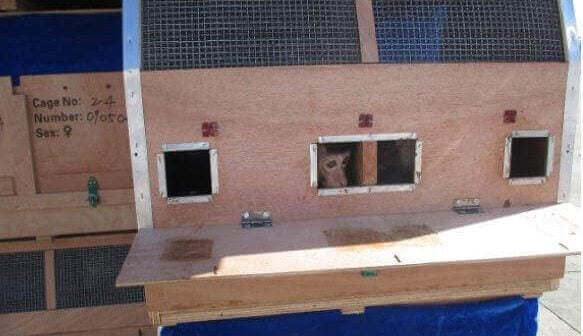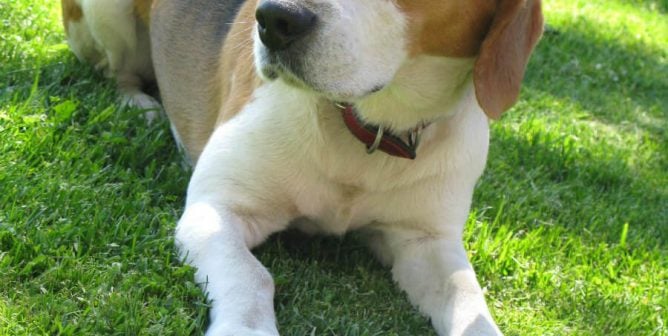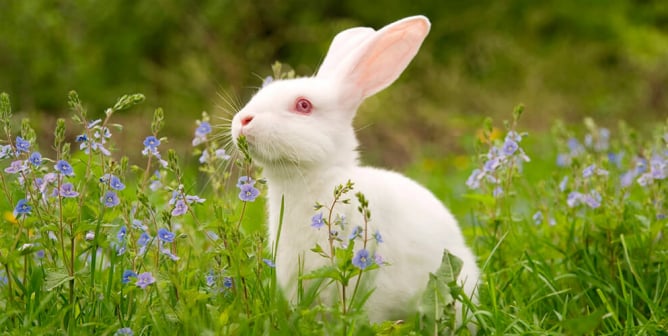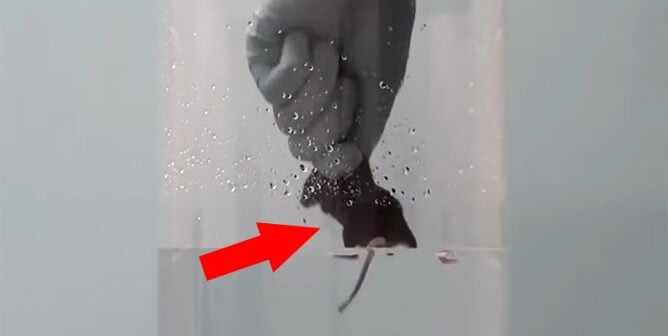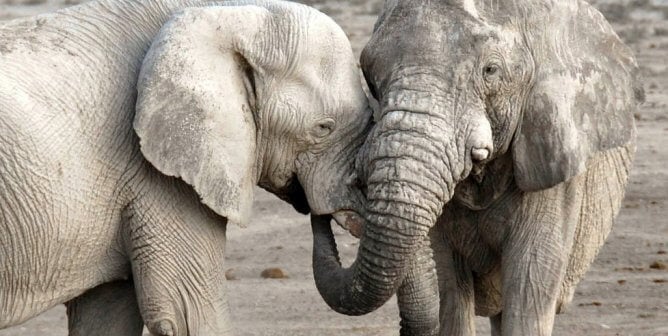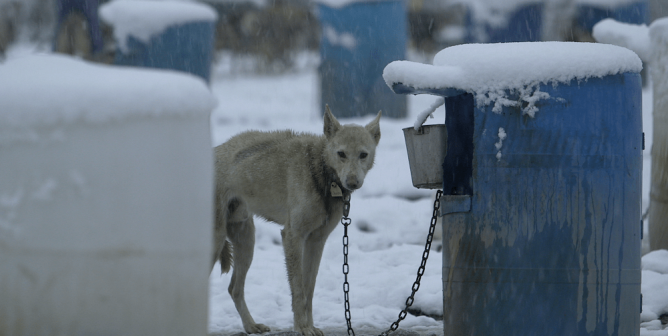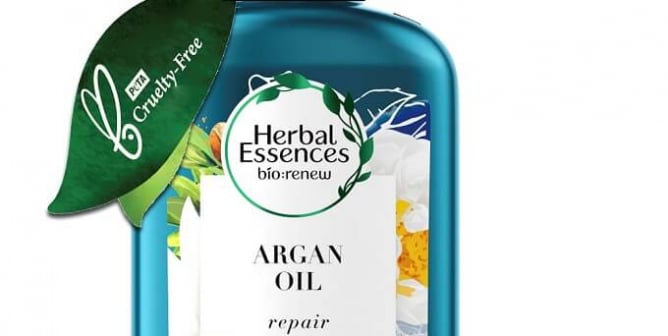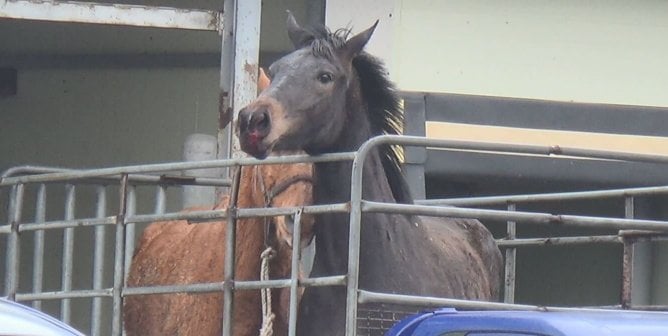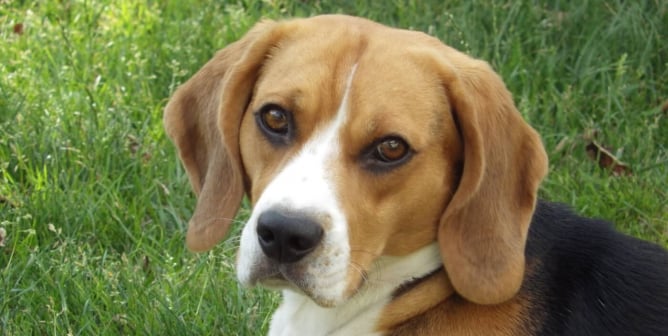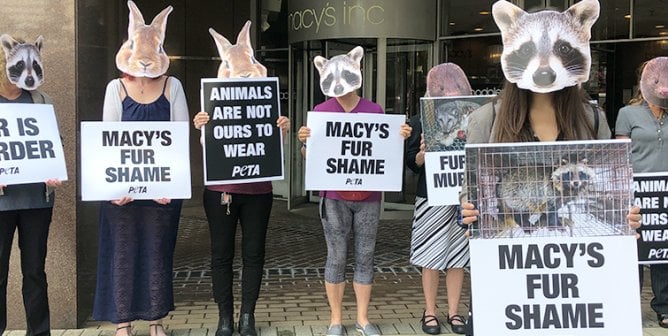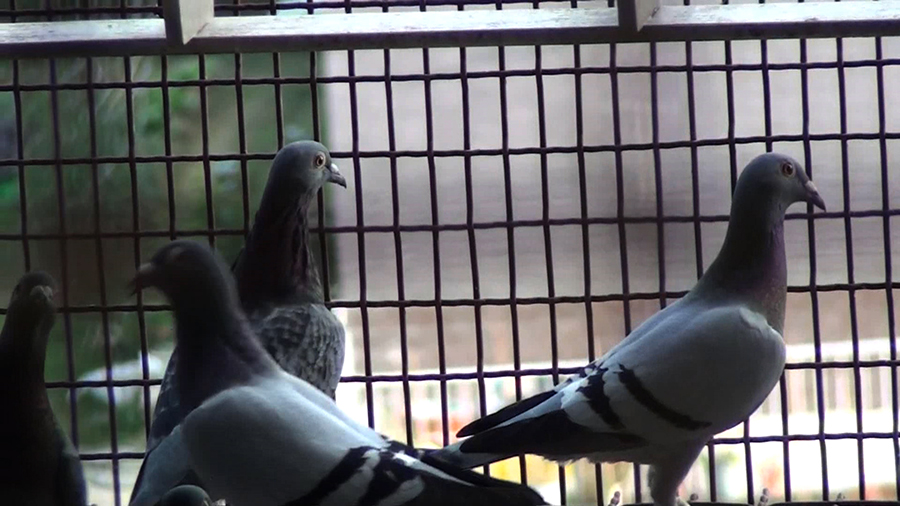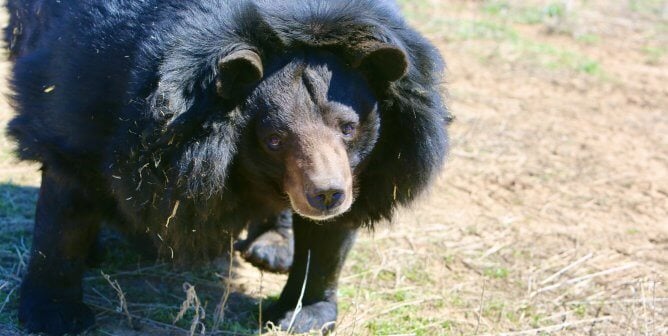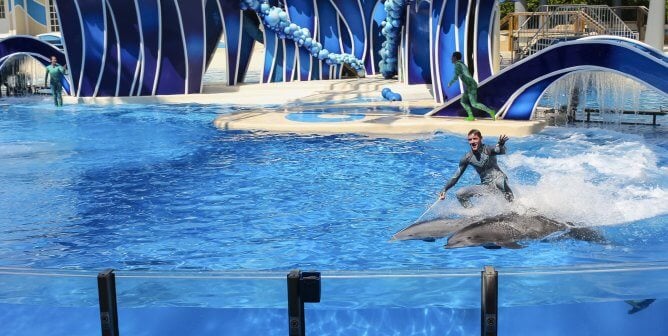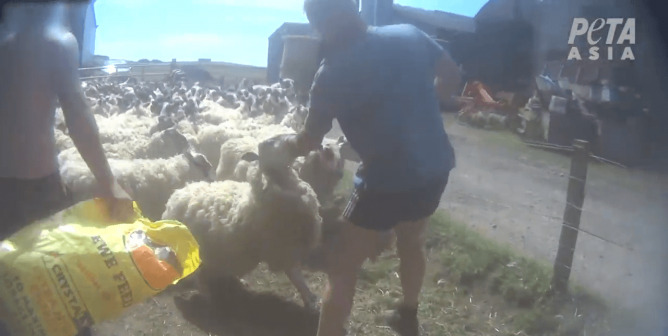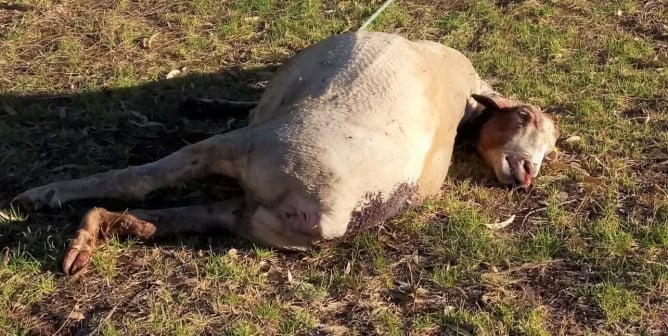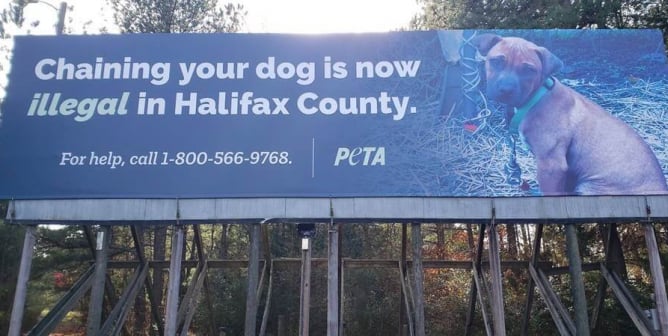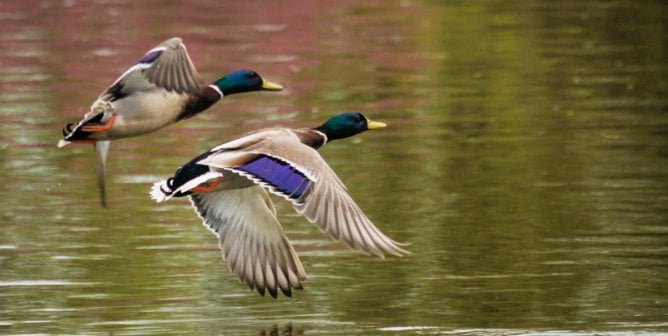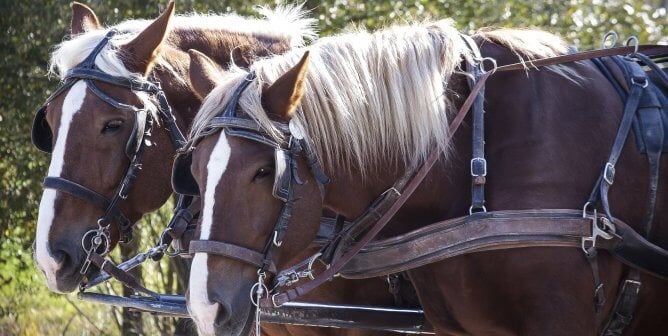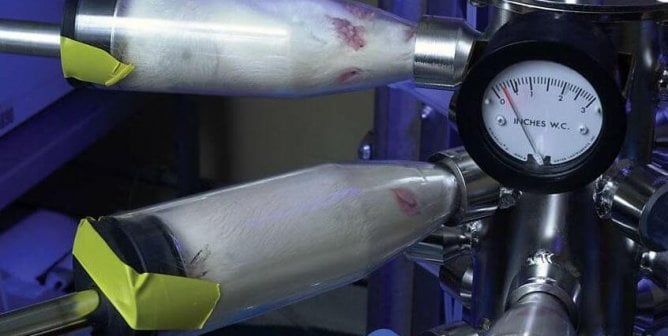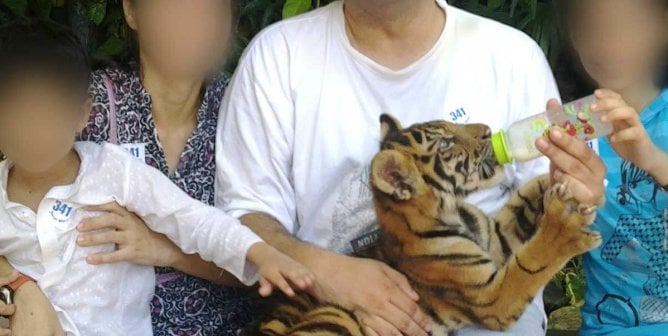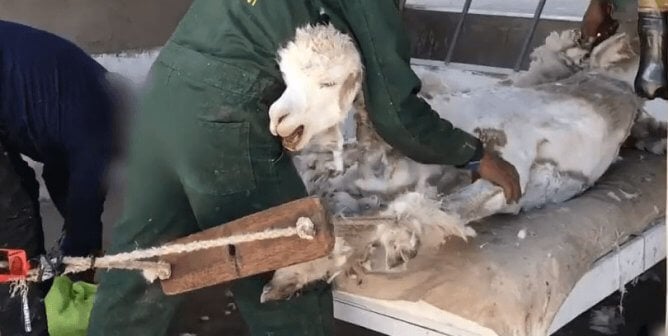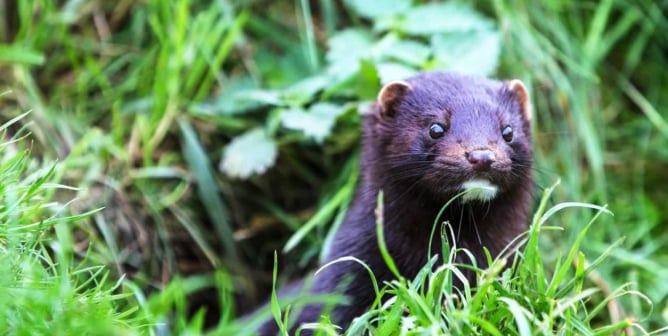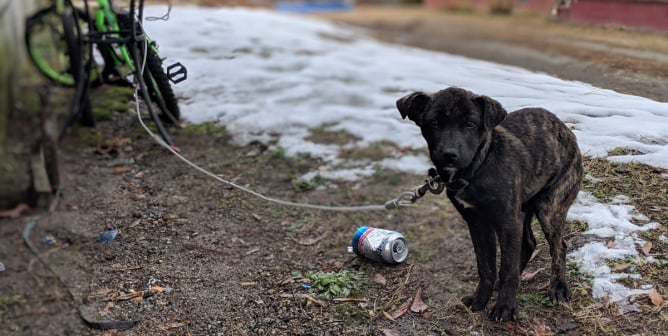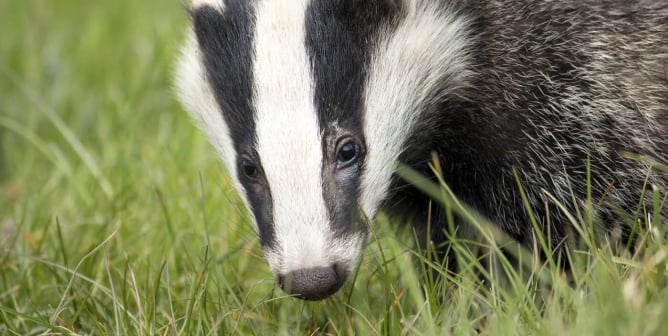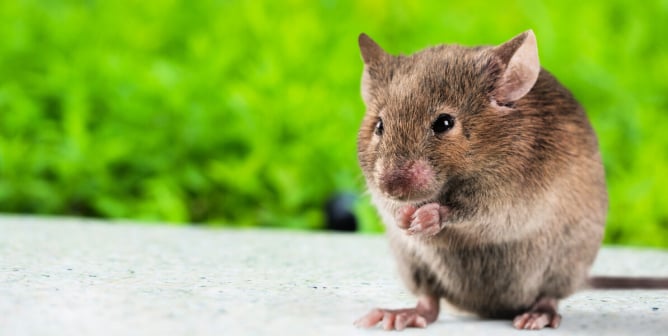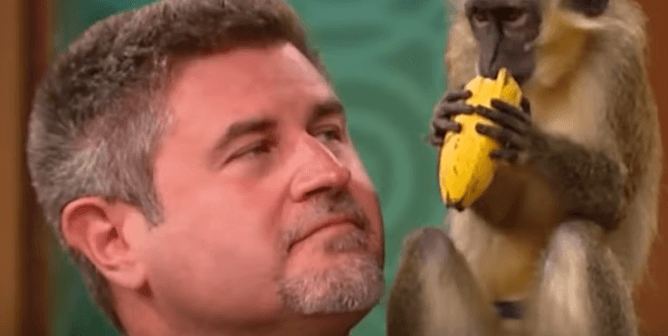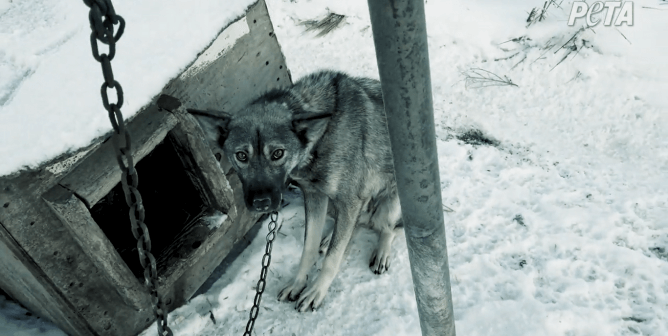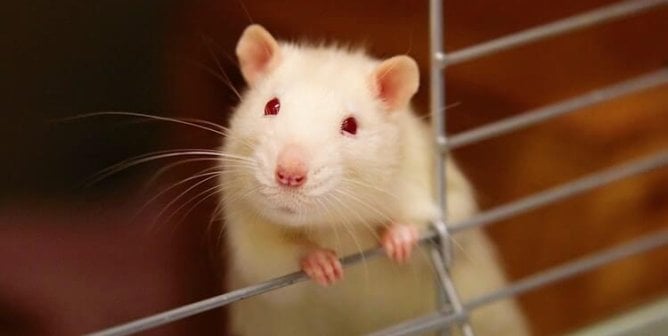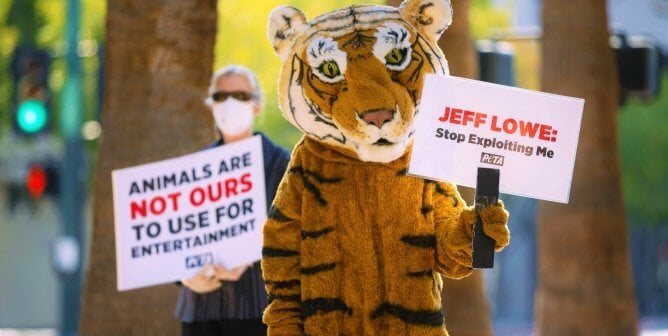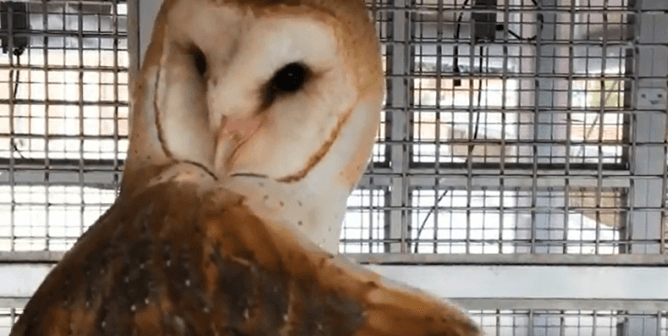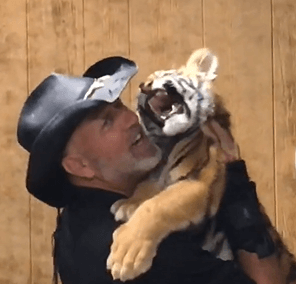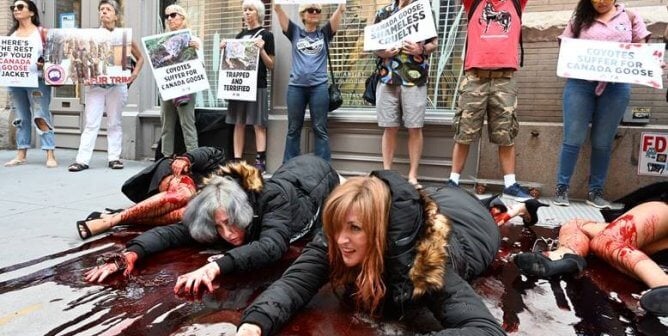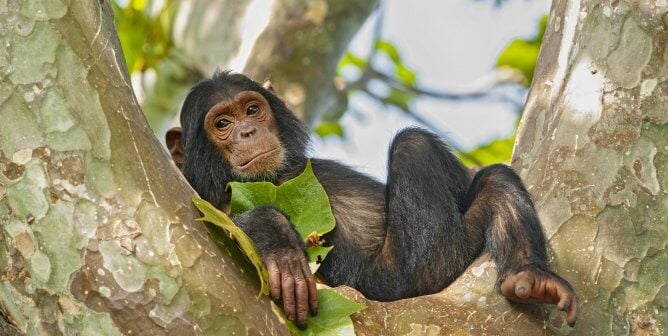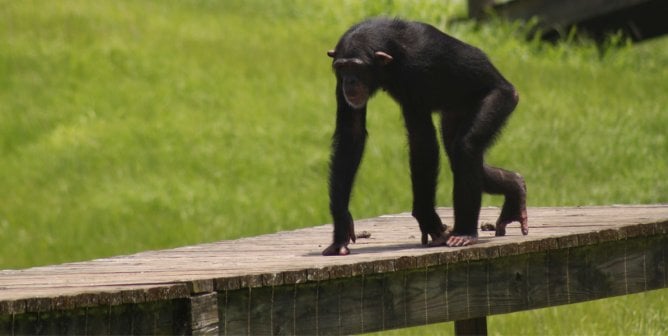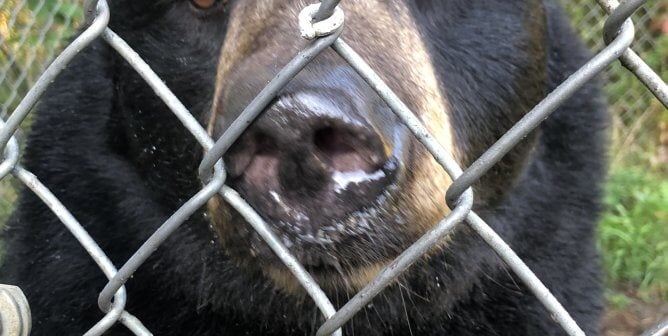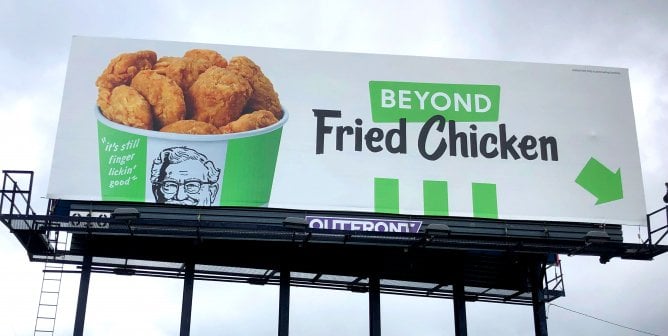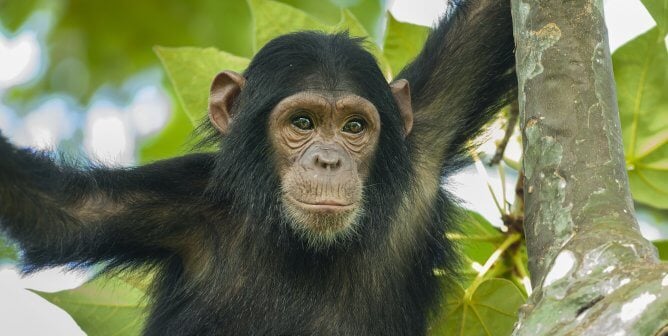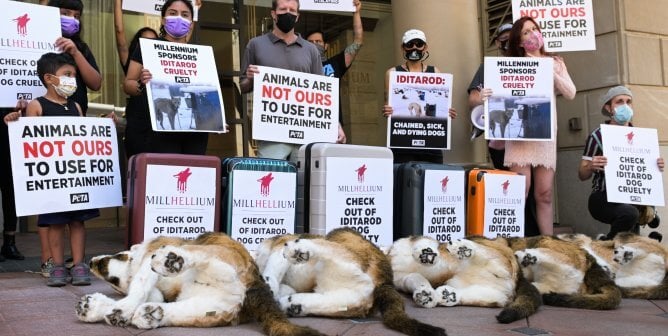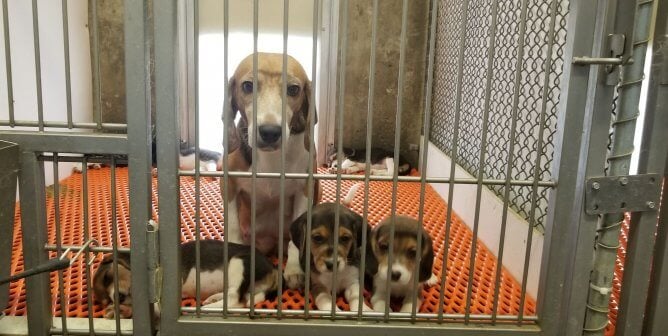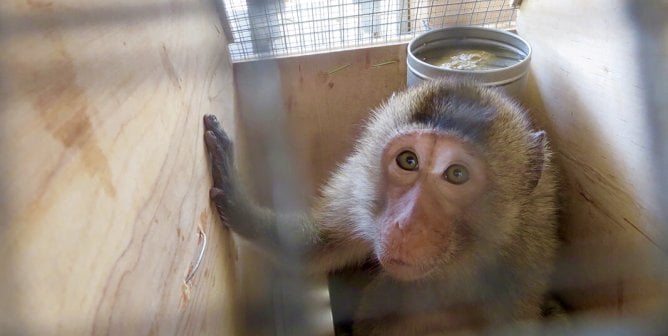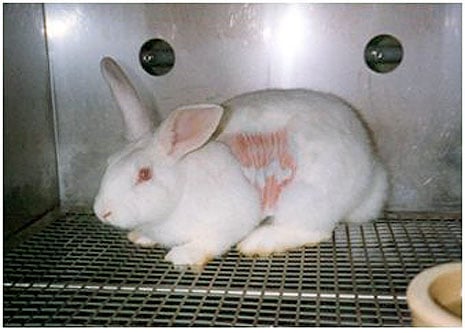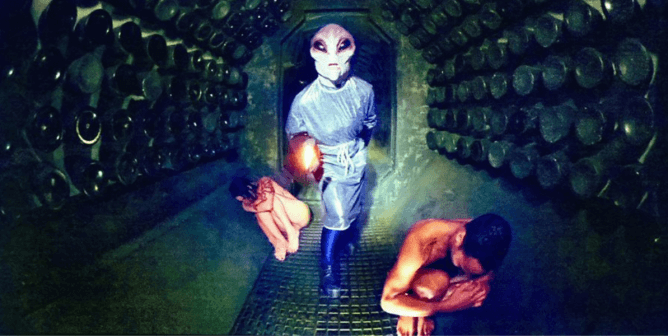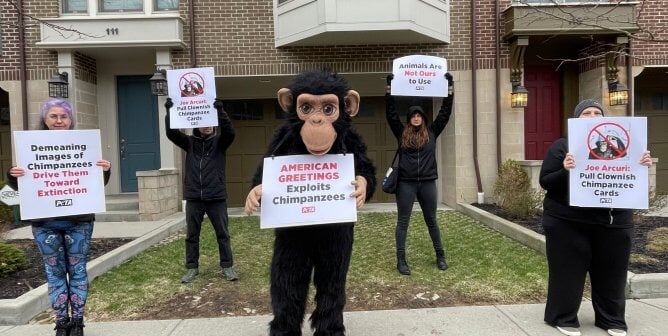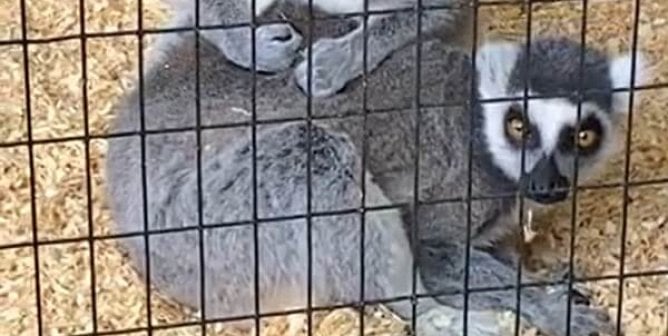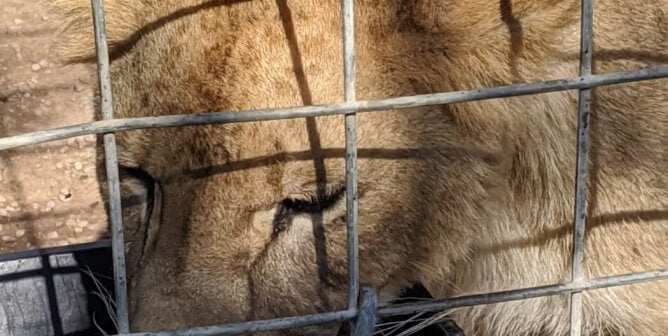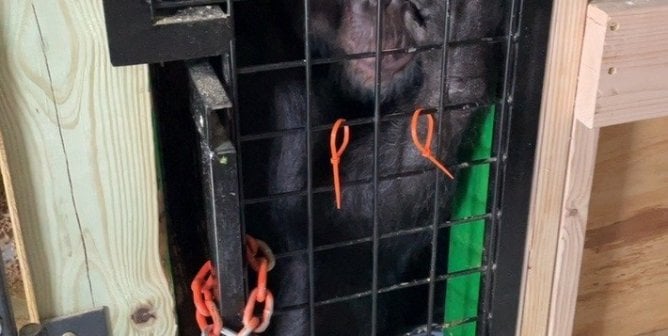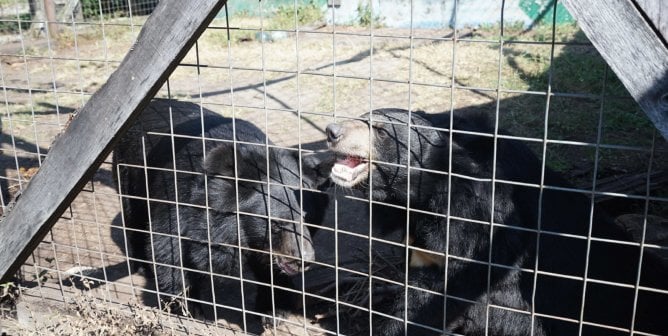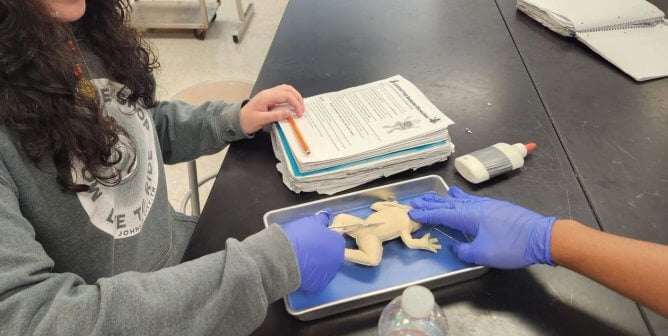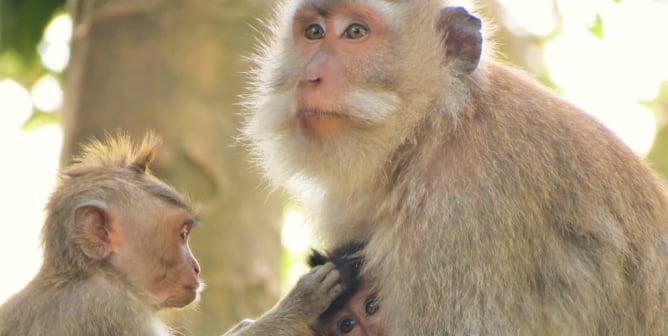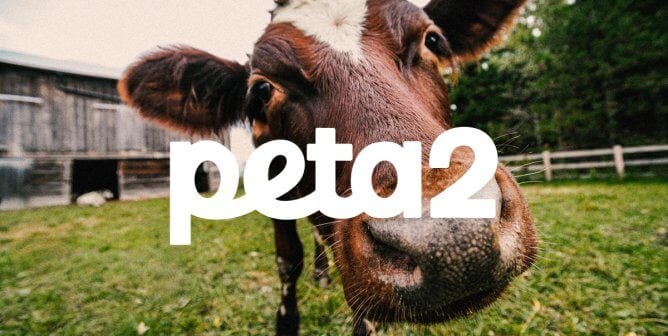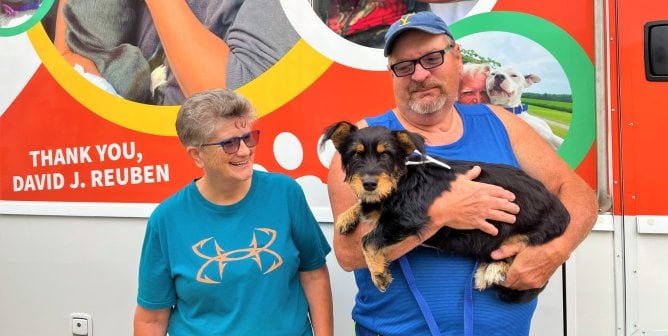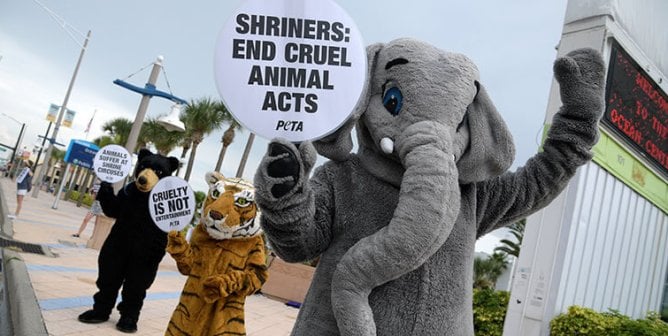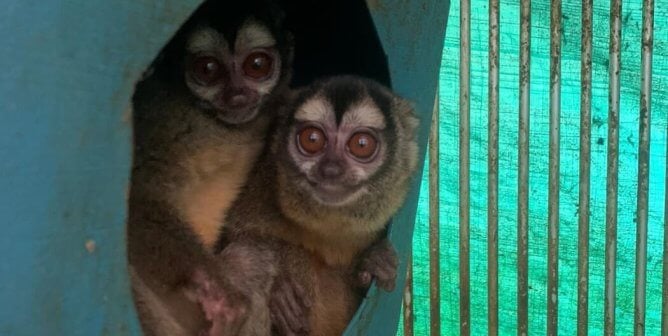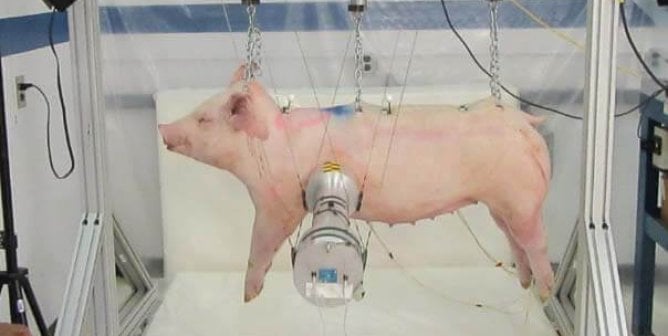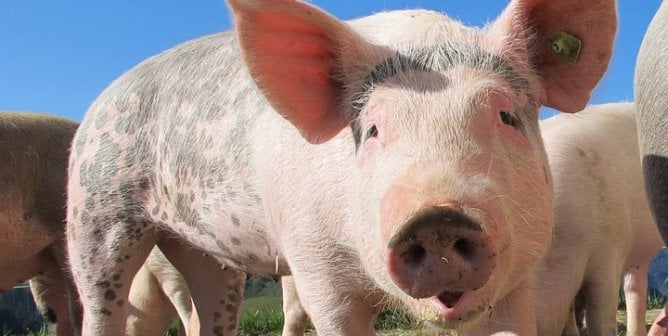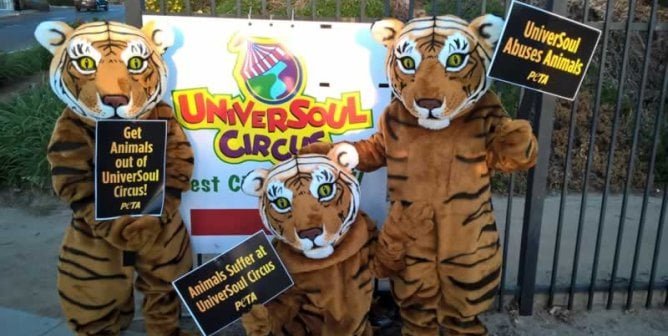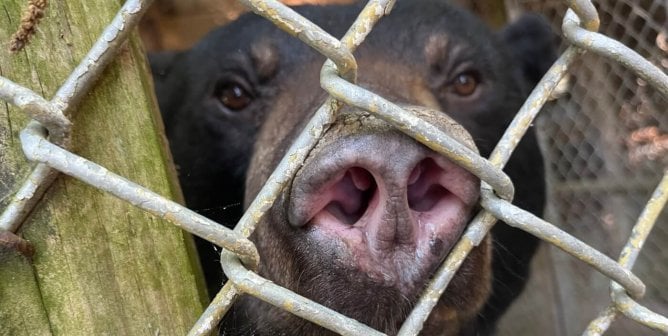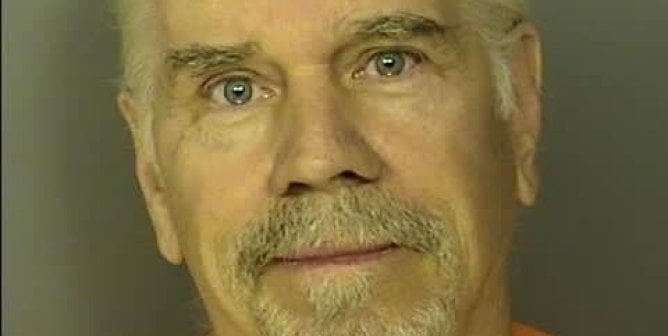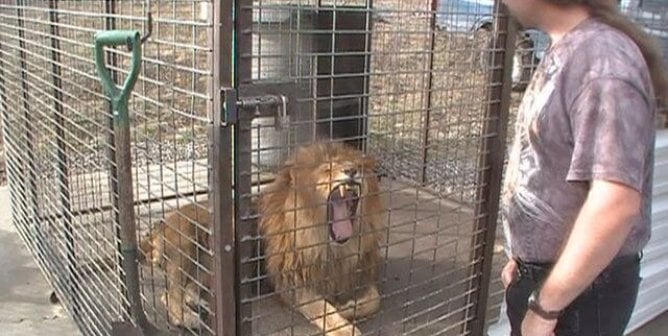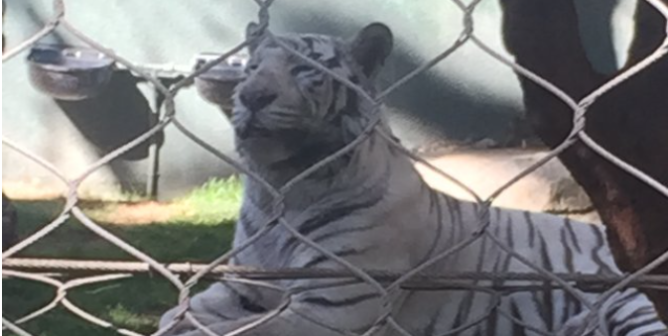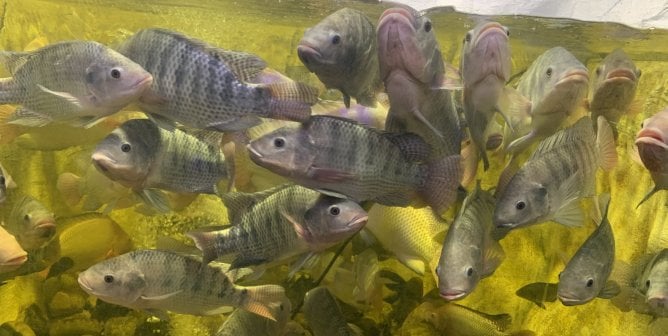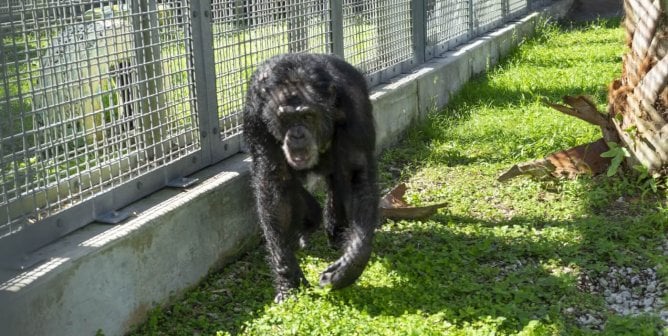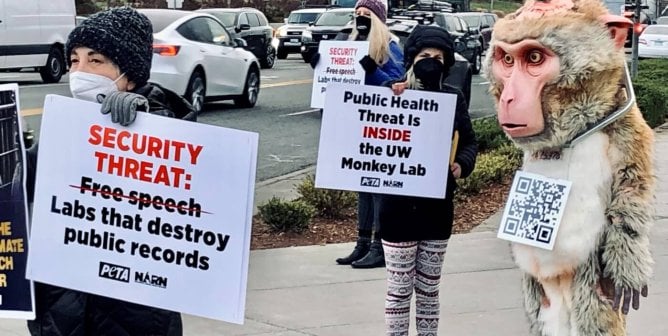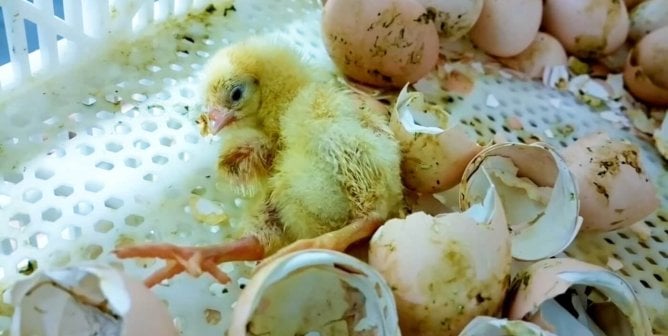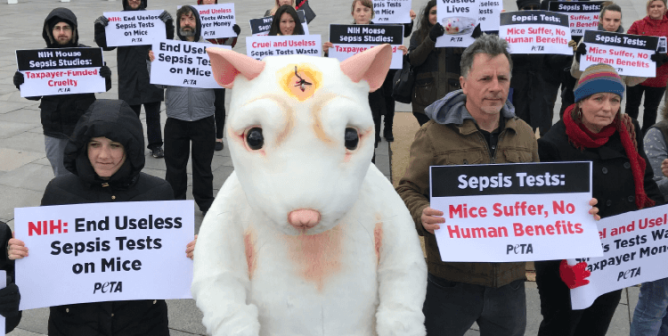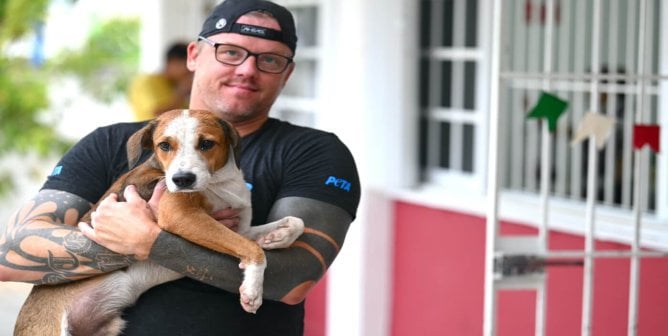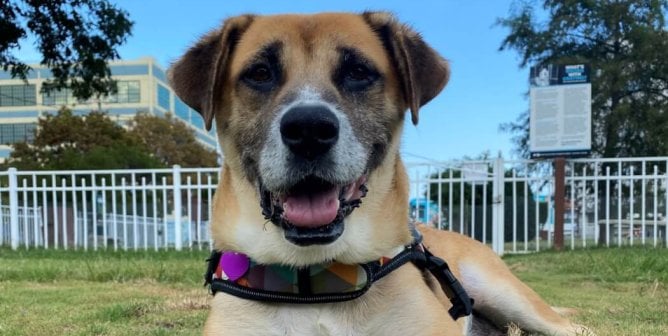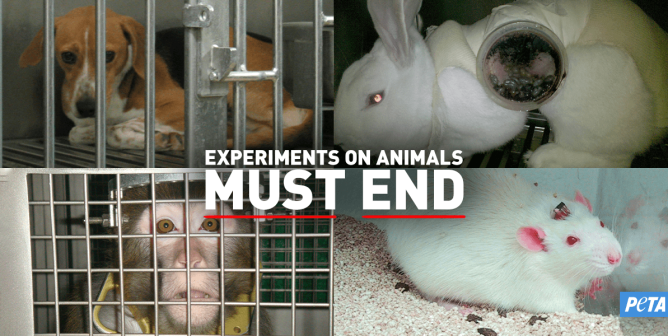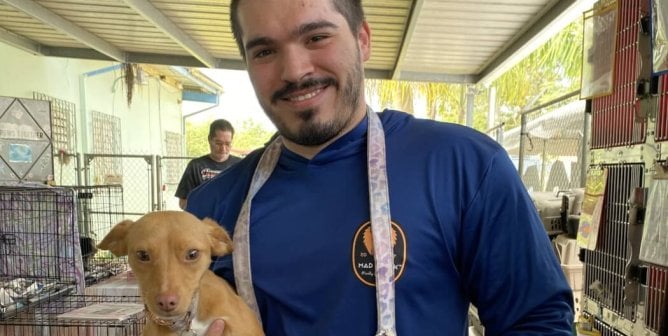
PETA President Ingrid Newkirk addresses some of the 35,000 people attending PETA’s Animal Rights Music Festival at the Washington Monument on June 11, 1988. It’s a breakthrough event that puts PETA on the pop-culture radar screen, with extensive coverage on MTV, thanks to headliners The B-52s, Natalie Merchant, and Howard Jones.
PETA persuades Avon, Benetton, Mary Kay, Amway, Kenner, Mattel, and Hasbro to stop testing on animals. Note: Many of these companies have started testing on animals again in order to sell their products in China.
PETA’s first sensational vegetarian commercial is “Meat Stinks” with Grammy winner k.d. lang in July 1990. The spot gets her banned on country radio networks but draws such massive coverage that her album goes gold! Her gold record still adorns the walls of the Sam Simon Center, PETA’s Virginia headquarters.
A California furrier is charged with cruelty to animals after a PETA investigator films him electrocuting chinchillas by clipping wires to the animals’ genitals. In another undercover exposé, PETA catches a fur rancher on videotape causing minks to die in agony by injecting them with a weedkiller. Both fur farms agree to stop these cruel killing methods.
PETA conducts an undercover investigation into the Nielsen Farms puppy mill in Kansas, which reveals extremely small enclosures and rampant sickness, abuse, and death. Our investigation leads to the closure of the facility and a $20,000 fine from the U.S. Department of Agriculture (USDA). The Nielsens are also “permanently disqualified from being licensed” by the USDA.
After a campaign that lasts 11 months and includes more than 400 demonstrations at McDonald’s restaurants in more than 23 countries, as well as advertising and celebrity involvement, McDonald’s becomes the first fast-food company to agree to make basic animal-welfare improvements for farmed animals.
PETA’s investigation into Aviagen Turkeys, Inc., part of the self-proclaimed “world’s leading poultry breeding company,” reveals that workers tortured, mutilated, and maliciously killed turkeys. Three former employees are indicted on felony cruelty-to-animals charges—the first felony charges for abusing factory-farmed poultry in U.S. history—and two become the first factory farmers to be convicted of abusing turkeys. One man is sentenced to one year in jail—the strongest penalty levied for abusing a factory-farmed animal in U.S. history—and all three are barred from owning or living with animals for five years.
PETA investigates a pig-breeding factory farm in Iowa and uncovers horrific treatment of sows, boars, and piglets. The manager of the farm is fired, and the evidence results in 22 criminal charges against six workers, all of whom admit guilt and are sentenced to serve up to two years’ probation.
After nearly a month of intense PETA campaigning against horrific combat training exercises conducted by the Bolivian military—in which live dogs are shown in a video tied down, repeatedly stabbed, and screaming in agony—the Bolivian Ministry of Defense ends the killing by issuing the military’s first-ever animal protection regulation, which “prohibit[s] all acts of violence, exploitation, [and] mistreatment that provokes the death of animals.”
Just one week after PETA releases the results of its shocking undercover investigation into Professional Laboratory and Research Services and files a complaint with the USDA, the North Carolina–based contract animal testing facility surrenders nearly 200 dogs and more than 50 cats and closes its doors. This is only the second time in U.S. history that a laboratory has been forced to surrender animals and shut down.
The USDA fines Ringling Bros. and Barnum & Bailey Circus $270,000—the largest fine ever paid by an animal exhibitor—for violations of the Animal Welfare Act after PETA presents the agency with unequivocal evidence of animal abuse, including beatings, the negligent death of a lion, lame elephants forced to perform despite chronic pain, and a baby elephant who died during a training routine.
PETA blows the lid off Ringling Bros.‘ violent training methods when a whistleblower shares photographic evidence from Ringling’s training compound revealing how baby elephants are torn away from their mothers and subjected to violent training sessions so that they will learn how to perform tricks.
In the first case of its kind, PETA, three marine-mammal experts, and two former orca trainers file a lawsuit asking a federal court to declare that five wild-caught orcas forced to perform at SeaWorld are being held as slaves in violation of the 13th Amendment to the U.S. Constitution. The filing—the first ever seeking to apply the 13th Amendment to nonhuman animals—names the five orcas as plaintiffs and seeks their release into their natural habitats or seaside sanctuaries.
PETA exposes disturbing video footage taken by a whistleblower during a trauma training session conducted by military contractor Tier 1 Group for members of the U.S. Coast Guard, which shows the stabbing, shooting, and dismemberment of live goats. Following an official complaint from PETA, the USDA cites Tier 1 Group for violating the federal Animal Welfare Act for failing to provide the goats with adequate anesthesia before they were mutilated.
By funding scientists to train Chinese government officials in the use of non-animal testing methods, PETA launches an effort to stop China from requiring tests on animals for cosmetics and household products. As part of its effort, PETA convinces cosmetics company Urban Decay to reverse its decision to sell its products in China, and John Paul Mitchell Systems pulls out of the Chinese market rather than having its products tested on animals.
After decades of conducting cruel experiments and just six months after PETA purchases stock in the company in order to introduce a shareholder resolution on animal testing, BIOQUAL announces that it will end its use of chimpanzees. Formerly known as SEMA, BIOQUAL was first exposed in 1986, when PETA released footage of chimpanzees locked inside tiny isolation chambers at the facility.
After two horses die on the set of the HBO horse-racing series Luck, PETA goes public with information obtained by whistleblowers as well as necropsy reports from the racing board revealing that older, arthritic horses had been used in dangerous and deadly racing sequences and that the horses appeared not to have been provided with adequate protection. After a third horse dies on the set, HBO announces the cancellation of Luck and ceases all production on the series.
After a long and hard-fought battle by PETA, the Animal Legal Defense Fund, and concerned citizens, Ben the bear is rescued from abhorrent conditions at a North Carolina roadside zoo. FedEx transports Ben free of charge (dubbing the mission “Bear Force One”) to the Performing Animal Welfare Society’s beautiful accredited wildlife sanctuary in northern California. There, Ben will live out the rest of his days splashing in his own pool, basking in the sun, and rolling in the grass in a 2-acre habitat designed especially for him.
After a two-month PETA undercover investigation documenting that thousands of animals were being neglected and dying and many more are being cruelly killed, law-enforcement officials raid Global Captive Breeders—a company in Lake Elsinore, California, that bred and sold reptiles and rats for the “pet” trade. This results in the largest rescue of neglected rats in U.S. history and the largest seizure of animals, including more than 600 reptiles and 18,000 rats, ever in California. Local authorities charge the owner and manager with a total of 223 felony cruelty-to-animals and related charges.
PETA prevails in a lawsuit against the U.S. Fish and Wildlife Service for illegally issuing captive-bred wildlife permits. This victory allows PETA to keep a closer eye on animals bred in captivity, weigh in on permit applications, and bring legal challenges against permits that are improperly issued to Ringling Bros., SeaWorld, Have Trunk Will Travel, and other animal abusers.
After years of imprisonment in concrete pits at Chief Saunooke Bear Park in Cherokee, North Carolina, 11 bears were finally freed following a years-long campaign and PETA undercover investigation that forced the roadside zoo to pay a fine and surrender its exhibitor’s license to settle more than a dozen charges for violations of the Animal Welfare Act. After a private benefactor generously offered to purchase the bears, they were quickly transferred to their new home at the International Exotic Animal Sanctuary in Dallas, where they can now walk through tall grass, dig in the dirt, climb trees, take a dip in a pond, and just live as bears are supposed to live.
PETA—along with the Animal Legal Defense Fund, investigative journalists, a political journalist, a university history professor, and animal rights advocate Amy Meyer, who had recently been arrested for filming a downed cow at a Utah slaughterhouse—files a groundbreaking lawsuit challenging Utah’s “ag-gag” law, which prohibits the documenting of animal abuse at agricultural operations. The plaintiffs contend that this agribusiness law amounts to an unconstitutional attack on investigators’ First Amendment rights.
After hearing from PETA that many sheep used for their wool endure a painful procedure called “mulesing,” in which huge chunks of skin and flesh are cut from their backsides without any painkillers, more than 50 national and international clothing retailers, including Abercrombie & Fitch, Liz Claiborne, H&M, Kenneth Cole, Perry Ellis International, and Express, state that they will use wool that comes only from nonmulesed sheep, as the industry begins to phase out the cruel practice.
Following PETA’s efforts to end dehorning in the dairy industry, in which calves have their horn buds burned off with no pain relief, companies such as Chipotle, Peet’s Coffee & Tea, and Amy’s Kitchen begin to pressure their suppliers to stop this cruel mutilation. Aurora Organic Dairy, the leading producer of private-brand organic milk and butter, is now breeding exclusively with bulls who carry the hornless gene.
In the wake of the 2013 release of the film Blackfish and PETA’s relentless campaign against marine animal abusement park SeaWorld reached a fever-pitch. As a result, public condemnation of SeaWorld led to a tanking stock price, and the company’s attendance, revenue, and profits continued to plummet.
I, Chicken, the first-ever empathy-building virtual-reality experience—which allows people to view life from a chicken’s perspective before being sent to slaughter—travels to more than 150 universities across the US, including Harvard, Stanford, Brown, Dartmouth, the University of Pennsylvania, and Princeton.
After intensive efforts led by PETA India and with scientific support from PETA US and the PETA International Science Consortium Ltd., India officially bans animal-tested cosmetics from being imported into the country. PETA India rallied support from scientists, ethical companies, celebrities, and powerful Indian government leaders.
Following an extensive PETA campaign to expose and end cruel and archaic brain experiments on cats at the University of Wisconsin–Madison, the federal grant money expired, the lead experimenter retired, and the embattled laboratory closed its doors for good. The remaining four cats in the laboratory were adopted into private homes.
After 35 years of PETA protests against cruelty to elephants in circuses, Ringling Bros. and Barnum & Bailey Circus announced that in response to growing public concern over “how the animals are treated,” it will end elephant performances by 2018. PETA also caught Ringling’s abuse on video and released to the world a former Ringling trainer’s photos of the circus’s violent baby-elephant training.
PETA launched a tour of its new “I, Orca” empathy project, which uses wireless Google virtual reality goggles to immerse participants in a world where they can swim freely in the ocean with their orca family. They will also meet an orca mother (voiced by Nurse Jackie star Edie Falco) who still mourns the baby who was stolen from her decades ago and sent to SeaWorld, where he has been sentenced to a miserable life in captivity. PETA took “I, Orca” on tour to cities near all three SeaWorld parks in the hope that after tourists and locals experience firsthand that SeaWorld means a lifetime of suffering for captive animals, they’ll choose to stick to animal-friendly entertainment.
PETA secures the first conviction for the production and distribution of disturbing “crush videos,” after supplying evidence to law-enforcement officials in Houston and encouraging federal authorities to press charges against Ashley Nicole Richards for violating the Federal Animal Crush Video Prohibition Act of 2010.
PETA files a groundbreaking lawsuit asking a U.S. federal court to declare Naruto—a free-living crested macaque—the author and owner of the internationally famous “monkey selfie” photograph, which he took using a photographer’s unattended camera. The aim is to get the court to declare a nonhuman animal the owner of property (the copyright of the photograph), rather than a mere piece of property himself.
In a landmark victory, PETA succeeds in getting a federal court to strike down Idaho’s “ag-gag” law as an unconstitutional violation of the First and 14th amendments to the U.S. Constitution. This is the first time that a court has declared an “ag-gag” statute unconstitutional.
After years of intense PETA-led campaigns—including demonstrations, celebrity outreach, and our cutting-edge “I, Orca” virtual reality project—SeaWorld announces that it will end its orca-breeding program. This means that the current generation of orcas imprisoned in SeaWorld’s tanks will be the last.
Following a PETA campaign that saw the end of year-long pesticide poisoning tests on dogs in 2007 in the U.S. and in 2013 in the E.U, PETA scientists succeeded in also convincing the Canadian government to end this testing, thus sparing hundreds of dogs from being forced to eat pesticide-laced food or inhale pesticide fumes every day for a year before being killed and dissected.
PETA scientists’ work with EPA and industry results in EPA announcement to reduce – and ultimately – eliminate the use of animals in lethal testing in which animals receive toxic doses of pesticides on their skin and in their eyes as well as being fed or forced to inhale these chemicals.
The Environmental Protection Agency (EPA) formally announced its plan to incorporate results from non-animal methods in its Endocrine Disruptor Screening Program as a step towards its stated goal of developing a set of in vitro methods to replace all animal studies in the program. The EDSP, as it is known, requires the testing of more than 10,000 chemicals for possible effects on the body’s hormonal systems, and in its original form, had the potential to kill millions of animals. EPA’s announcement means the agency is largely following the roadmap that PETA scientists have laid out for the program over the past decade through ongoing meetings with EPA, participation in working groups, submission of numerous technical documents, and the publication of several articles.
Following a PETA India investigation documenting the abuse of thousands of horses, donkeys, and mules in antitoxin production, the PETA International Science Consortium funds the development of a non-animal replacement for the diphtheria antitoxin, ordinarily made by repeatedly injecting horses with toxins and drawing large volumes of their blood.
After years of PETA campaigning, funding and promoting non-animal testing methods, The Frank R. Lautenberg Chemical Safety for the 21st Century Act is signed into law. By modernizing the American system of chemical toxicity testing and requiring, for the first time, that the Environmental Protection Agency reduce and replace the use of animals, the law will spare tens of thousands of animals the agony of chemical testing.
In a landmark case following the release of a PETA exposé, at least six shearers were charged with a minimum of 70 counts of cruelty to animals for the first time in history. The exposé documented that wool industry workers in Australia beat scared sheep in the face with electric clippers and punched and stomped on their heads and necks. The first five defendants pleaded guilty. The first to be sentenced was banned from shearing or being in charge of farmed animals for two years.
Until recently, rats were being used in cruel experiments to test—of all things—raspberries. The National Processed Raspberry Council and the Washington Red Raspberry Commission had been funding misguided experiments that looked at the effects of raspberries on everything from diabetes, obesity, and cardiovascular disease to balance and coordination. But following discussions with PETA, both groups have confirmed that they will no longer fund experiments on animals.
Citing a “dramatic drop” in ticket sales, Ringling Bros. and Barnum & Bailey Circus announced that it was shutting down after 146 years. PETA has targeted Ringling for over three decades, holding protests outside every performance; publicizing photos and videos showing trainers beating, striking, hooking, whipping, and roughly handling animals; and lobbying for bans on bullhooks and animal performances. We filed more than 130 formal complaints against the circus with the USDA, met with the agency numerous times, and documented gross neglect, prolonged chaining, and animal deaths—including those of a baby elephant who died after breaking his legs during training, another who was forced to perform while fatally ill, and a lion who died of heatstroke in a Ringling boxcar.
PETA pressed, and we got results: Multibillion-dollar pharmaceutical and medical-device maker Sanofi has committed to not killing animals anymore in training sessions for sales personnel. This comes after PETA uncovered evidence that the company was using live animals to demonstrate invasive medical-device procedures for sales representatives.
Hundreds of animals in four developing countries will no longer be cut apart and killed in medical training courses, thanks to PETA’s donation of eight state-of-the-art TraumaMan surgical simulators, worth $200,000. This brings the total number of countries that have ended the use of dogs, pigs, goats, and sheep for crude medical training to 20, following our donations of more than 100 TraumaMan simulators worth close to $3 million over the last three years.
Following an extensive, nearly four-year campaign by PETA, the Royal Australasian College of Surgeons (RACS) announced that it’s ending its use of animals for trauma training. This means no more cutting holes into the throats, chests, or limbs of live pigs and sheep. Thousands of people sent e-mails to RACS officials through PETA’s online action alert, more than 100,000 people signed a PETA Australia petition, and thought-provoking ads and protests featured numerous outspoken “pigs.”
Following pressure from PETA and U.S. Rep. Lucille Roybal-Allard (D-Calif.), the U.S. Coast Guard has become the first branch of the military to suspend the shooting, stabbing, and killing of animals in trauma training drills while it studies available human simulators and other non-animal training methods that could be used instead. The Coast Guard confirmed that the moratorium came into effect after a PETA exposé prompted an official review by the agency.
Working with the company Good Clean Love, PETA convinces the US Food and Drug Administration to accept results from simple non-invasive skin tests on human volunteers instead of requiring that rabbits and guinea pigs be injected with lubricants. This precedent-setting ruling not only spared the lives of the specific animals who would have been used, but sets a clear guide to allow other companies to also use tests that don’t require animals.
In the June 2017 issue of Corporate Counsel magazine, the PETA Foundation earned the magazine’s prestigious Best Legal Department of 2017 honor. In the history of the award, only one other nonprofit organization has ever won, and we are the first animal advocacy organization to earn the title. The magazine stated that the PETA Foundation attorneys have “fundamentally shifted the animal law landscape in this country.”
In July, the U.S. District Court of Utah declared Utah’s ag-gag statue unconstitutional, finding that it violates the First Amendment’s free speech protections. The law was targeted specifically at PETA and undercover investigations, and prohibited gaining access to agricultural operations by false pretenses, such as by lying on an employment application, and filming once inside. This is the second time that a state ag-gag statue has been declared unconstitutional as a result of a lawsuit filed by PETA and others, and is a crucial victory to ensure that we can continue informing the public about the egregious cruelty that animals suffer behind closed doors.
The PETA International Science Consortium co-hosts workshops and webinar series to develop replacements to using animals in inhalation toxicity testing and awards $400,000 worth of in vitro inhalation exposure equipment to four laboratories that will provide inhalation testing to companies without the use of animals for the first time.
After several years of campaigning on behalf of a suffering elephant named Nosey, PETA rejoiced when Alabama authorities seized her from her neglectful handler, Hugo Liebel. She had been routinely forced to give rides and perform despite her aching, arthritic joints, but she’s now receiving the respite and care that she deserves at an accredited elephant sanctuary.
Following years of pressure from PETA and U.S. Rep. Lucille Roybal-Allard (D-Calif.), the U.S. Coast Guard has become the first branch of the military to end the shooting, stabbing, dismembering, and killing of animals in trauma training drills. In public records obtained by PETA, the agency confirmed the ban in writing, adding that it will now use superior medical simulators in these training exercises.
After PETA’s exposé led to the closure of The Pet Blood Bank in Texas, a filthy dog blood farm, and the rescue of 151 greyhounds, the greyhound racing industry adopted long-overdue standards on blood banks. The National Greyhound Association barred its members from directly sending greyhounds to any blood bank operation, established rules for the length of time dogs can be used for their blood, and requires spaying or neutering, veterinary exams, and subsequent adoption.
The Japanese government stops requiring year-long pesticide poisoning tests on dogs, sparing hundreds of dogs. The move came after PETA scientists provided extensive scientific support for doing so over the course of three years. Japan joins the U.S., the E.U., and Canada in dropping this requirement after urging from PETA.
On March 2, 2017, we filed a complaint alleging that the city of Arcadia violated the California Environmental Quality Act when it adopted a program to trap and kill coyotes without first assessing the environmental impact that such actions would have. On April 4, the City Council rescinded its prior adoption and allocation of funds for the trapping program—which effectively mooted the substance of our case.
After decades of campaigning against fur, we’ve reached a tipping point: Hundreds of major companies have banned it—including high-end designers Giorgio Armani, Gucci, John Galliano, Donna Karan, Donatella Versace, Michael Kors, and Jimmy Choo—and InStyle became the first major fashion magazine to ban it. Meghan Markle, the Duchess of Sussex, won’t wear it, and San Francisco and Norway both banned it, joining Bosnia and Herzegovina, Croatia, Germany, and Japan.
PETA’s 2013 exposé of the angora wool industry, which revealed that rabbits scream in pain as they’re stretched across boards and their hair is torn out, led more than 330 brands worldwide to ban angora. These include the world’s three largest retailers—H&M, Gap Inc., and Inditex (which owns Zara)—as well as Stella McCartney, Topshop, ASOS, Forever 21, Ralph Lauren, and Italian luxury designer Gucci. Just one year after we released the video footage, exports were down 85 percent—numbers are now so low that trade information databases have stopped tracking angora. PETA’s campaign has decimated the industry.
PETA’s 2018 video exposé of the mohair industry—which was the world’s first behind-the-scenes look into it—revealed egregious abuse in South Africa, the world’s top mohair producer. After learning from PETA that mohair is stolen from terrified angora goats—who are often cut open during shearing, dragged, thrown by the legs and tails, and mutilated before being killed—more than 300 brands around the world banned the fiber. Inditex, Zara, Topshop, Gap, H&M, ASOS, Ralph Lauren, Diane von Furstenberg, Brooks Brothers, Crate & Barrel, Esprit, Forever 21, Express, and UNIQLO are just a few of the kind companies to do so.
In a monumental victory for animals, Chanel became the first major high-end fashion brand to ban exotic skins—including those from crocodiles, lizards, and snakes! Fashion icon and designer Victoria Beckham also pledged to stop using exotic skins in her designs, and luxury clothing brand Diane von Furstenberg pledged to stop using them as well. These victories follow decades of pressure from PETA and mean that countless animals will be spared a miserable life and a painful, violent death.
Following Israel’s historic ban on “shackle and hoist” beef imports, the largest U.S. kosher certifier, the Orthodox Union (OU), announced that it would no longer accept beef from slaughterhouses that use that archaic and cruel method of kosher slaughter. The OU said that roughly one-third of the kosher beef that it certifies for import into the U.S. comes from South America—where PETA has conducted three investigations documenting the painful method.
AirBridgeCargo Airlines enacted a policy banning the transportation of monkeys to laboratories anywhere in the world following a campaign in which tens of thousands of PETA supporters contacted the airline to urge it to stop participating in this sordid trade. On these types of flights, monkeys who were bred on squalid factory farms or taken from their families in the wild are crammed into small wooden crates and transported to laboratories, where they endure all manner of torment and are denied everything that’s natural and important to them.
Dove—one of the world’s most widely available personal care–product brands—bans all tests on animals anywhere in the world and is added to PETA’s Beauty Without Bunnies cruelty-free companies list. In addition, Unilever—which owns the Dove brand—bans all tests on animals not required by law for the rest of its products and is added to PETA’s list of companies “Working for Regulatory Change,” a category that recognizes businesses that test on animals only when explicitly required to do so by law, are transparent with PETA about any tests on animals that have been conducted and why, and work diligently to promote the development, validation, and acceptance of non-animal methods.
After meeting with PETA, AbbVie became the first pharmaceutical company to ban the use of the forced swim test—in which mice, rats, and other small animals are placed in beakers filled with water from which they can’t escape and are forced to swim in order to avoid drowning. The company posted this landmark new policy on its website. The meeting followed PETA’s submission of a shareholder resolution calling on the company to stop funding, conducting, or commissioning the cruel test.
Following a PETA Asia exposé of an elephant polo tournament in Thailand, PETA and our affiliates persuade a dozen companies—including IBM, Johnnie Walker, and Vespa—to drop their sponsorships. The tournament’s organizing body later announced that it won’t seek another permit, effectively putting an end to elephant polo in the country.
Procter & Gamble’s iconic Herbal Essences brand is added to PETA’s Beauty Without Bunnies list of cruelty-free companies. And even though Herbal Essences is sold in China, where tests on animals are required for many products, the brand has worked within Chinese regulations to make sure that such tests will not be done on its products. Over the years, Procter & Gamble has shown a major commitment to ending the use of animals in tests wherever and whenever possible and has worked for years to develop and promote non-animal methods.
In the first South Korea prosecutions of their kind, a supervisor, a worker, and the Jeju Livestock Cooperative were fined for killing horses in front of each other, following PETA’s investigation into the beatings and killing of racehorses at South Korea’s largest horse slaughterhouse. In addition, the Korea Racing Authority created a retirement plan and started funding a program to reduce the number of horses going from the racetrack to the dinner table.
Following decades of pressure from PETA and hundreds of thousands of letters from our supporters, Macy’s banned fur! PETA’s campaign urging Macy’s to go fur-free started back in the 1980s—when we made it our prime target for Fur-Free Friday and activists were arrested for blocking the doors at its Herald Square store in New York and for disrupting its Thanksgiving Day Parade.
A Taiwan court ruled against pigeon racers and organizers, concluding a four-year battle following a PETA investigation. At least 239 people faced prison or fines—the most ever prosecuted as a result of a single PETA investigation. More than a million pigeons die in Taiwan every year after they’re released in the middle of the ocean and forced to fly back home, even in typhoon-strength winds.
A federal court ruled in PETA’s favor on every issue presented at trial in PETA’s lawsuit against Tri-State Zoological Park, holding that the Maryland roadside zoo violated the Endangered Species Act by failing to provide animals with adequate veterinary care, sanitation, companionship, and enrichment. Tri-State, which the judge described as “fetid and dystopic,” is now prohibited from owning or possessing endangered or threatened species in the future, and the surviving big cats—two tigers and a lion—were transferred to an accredited sanctuary.
Dillan—a morbidly obese Asiatic black bear suffering from painful and life-threatening dental disease—was rescued from a small concrete cage at a Pennsylvania hunting club. He received the treatment that he desperately needed at The Wild Animal Sanctuary in Colorado, where he hibernated for the first time ever, and is now enjoying a beautiful habitat with acres to forage and explore with his new companion, a PETA-rescued bear named Lily. Since 2012, PETA has helped rescue over 70 bears.
SeaWorld agrees to stop making trainers stand on dolphins’ faces and ride on their backs as though they were surfboards in cruel and demeaning circus-style shows. This victory follows a months-long PETA campaign that included a veterinary report, a shareholder question posed by Alec Baldwin, a shareholder resolution, numerous local ads, and e-mails from more than 133,000 of our members and supporters.
After almost a decade in the making, a ban on the unattended tethering of dogs was passed in Halifax County, North Carolina. This new ordinance will be a game changer for the countless dogs suffering on chains in this large rural county. PETA worked closely with commissioners and law-enforcement officials to make this happen and spread the word with eye-catching billboards, fliers, radio ads, and more.
The U.S. Environmental Protection Agency no longer requires a test in which birds are fed pesticide-laced food for days before being killed, sparing approximately 700 mallards and quails each year, after a paper the agency co-authored with PETA scientists showed that the test does not help protect the environment.
In a landmark victory for horses, the Chicago City Council passes a ban on cruel and dangerous horse-drawn carriage rides, making the Windy City the largest city in the country to ban the archaic industry. PETA supported the Chicago Alliance for Animals’ push for a progressive ban every step of the way.
Funding from the PETA International Science Consortium Ltd. contributed towards the creation of a first-of-its-kind 3D model of the deepest part of human lung. The model can be used to study the effects of inhaling different kinds of chemicals, nanomaterials, pathogens, and (e-)cigarette smoke, preventing tens of thousands of rats and mice from being confined to small tubes and forced to inhale them for hours, even repeatedly over several months, before being killed.
The dominos of the big-cat cub-petting industry continued to fall as a result of PETA victories in the courtroom. PETA was two for two against cub petting, winning lawsuits against exhibitors who violated the Endangered Species Act (ESA) with their practices of separating cubs from their mothers and using them in public encounters. These victories allowed PETA to rescue 33 more big cats from three cub-petting facilities—all of which have subsequently shut down—and to set the first-ever federal precedent holding that prematurely separating big-cat cubs from their mothers, declawing them, and using them for public encounters are violations of the ESA. Since 2017, PETA has rescued a total of 75 big cats from roadside zoos. The message to all big-cat abusers is clear: With PETA on the case, their days of exploiting animals are numbered.
After a first-of-its-kind undercover PETA investigation of one of the world’s largest alpaca wool producers revealed that crying alpacas were roughly shorn, cut open, and left bleeding from deep wounds, we persuaded major companies—including UNIQLO, Overstock.com, and ESPRIT—to make the compassionate decision to ban alpaca wool.
Following a strong PETA campaign and e-mails from more than 280,000 of our supporters, the world’s leading beauty retailer, Sephora, bans fur eyelashes. This causes several beauty and eyelash companies to follow suit, including Velour, Coco Mink Lashes, and GladGirl. PETA had pointed out that fur used in false eyelashes typically comes from fur farms, where stressed animals frantically pace, circle endlessly, and gnaw on their own bodies inside cramped wire cages—until they’re gassed or electrocuted or their necks are broken.
A new Virginia law prohibits keeping dogs tethered during certain weather conditions. Since 2016, PETA has worked closely with legislators, testifying in behalf of dogs kept tethered and vigorously lobbying for bills to protect them from cruelty and neglect. While we wish all dogs lived indoors with loving families, this law will help protect those forced to live outside.
After PETA shares a horrifying video exposé of China’s badger-brush industry with companies, nearly 100 brands worldwide—including Morphe, NARS Cosmetics, and Sherwin-Williams—ban badger hair. PETA Asia’s investigation had revealed that in order to make makeup, paint, and shaving brushes, workers confine badgers inside small wire cages on farms. Slaughterhouse workers beat crying badgers over the head with a chair leg and slit their throats.
The Taiwan Food and Drug Administration (TFDA) updated its health-food safety testing regulations, which will now prioritize widely recognized non-animal test methods—a landmark move that follows PETA’s recommendation to accept animal-free test methods approved by international regulatory bodies. With the TFDA’s adoption of our recommendation, there should be little to no health-food safety tests on animals in Taiwan going forward.
For years, Grant Kemmerer frequently provided talk shows with bears, primates, big cats, and other wild animals and allowed prohibited direct contact between the animals and members of the public, including Robert and Bindi Irwin, Jimmy Fallon, George Stephanopoulos, and Wendy Williams. However, after PETA alerted New York authorities to these violations, they denied Kemmerer’s license to exhibit wild animals in the state until at least 2023!
ExxonMobil—a major Iditarod sponsor, giving $250,000 a year—confirms that 2021 will be the last year that it will sponsor the death race. Shortly thereafter, Craft Sportswear, Medical Park Family Care, and Anchorage Distillery drop their sponsorships as well. These victories follow the 2020 termination of sponsorships by Alaska Airlines, Baird Private Wealth Management, and Chrysler’s Anchorage dealership. The Iditarod has lost $350,000—nearly half—of its prize money in recent years as public condemnation of the race has grown.
After hearing from PETA, biopharmaceutical giant Amgen confirmed that it had stopped conducting the forced swim test, in which small animals are typically dosed with a test substance, dropped into inescapable beakers of water, and forced to swim for their lives. Twelve of Amgen’s competitors, including Bayer, Johnson & Johnson, and GlaxoSmithKline, enacted bans against the test after PETA contacted them.
PETA plays an integral role in a major victory when the U.S. Department of Justice (DOJ) seizes 69 protected big cats from Lauren and Jeff Lowe, operators of Tiger King Park, named after the Netflix docuseries that made the Lowes (and their exploitation of tigers) infamous. The DOJ’s search and seizure warrant was based in part on evidence obtained by PETA—including testimony regarding big-cat breeding in violation of a court order and evidence regarding the appalling condition of lions PETA rescued from the Lowes in 2020.
In a groundbreaking constitutional case for animal rights, PETA filed a lawsuit against the federal government as a “next friend” to 30 barn owls being used in deadly brain experiments at Johns Hopkins University. PETA alleges that the loophole in federal law that allows the taxpayer-funded tests is unconstitutional and seeks protection from harm for the birds under the federal Animal Welfare Act, from which they are currently excluded.
The U.S. District Court for the Southern District of Indiana ordered Tim Stark and Wildlife in Need (WIN) to pay PETA fees and costs totaling $733,997.70 in relation to our victory under the Endangered Species Act (ESA). Because Stark and WIN already owed us $19,234.40 in unpaid fee awards, we’ll be seeking to recover $753,232.10. The award follows our groundbreaking litigation success that resulted in the rescue of 25 big cats and established that declawing big-cat cubs, separating them from their mothers, and holding cub-petting events violate the ESA.
At the urging of PETA, CVS, Rite Aid, and Boots ban the sale of greeting cards that contain unnatural images of chimpanzees and orangutans. “Clownish” images lead consumers to believe that these animals aren’t endangered and increase the black market demand for them as “pets.”
After more than a decade of campaigning—which included an eyewitness investigation, a news conference featuring Alan Cumming, parallel campaigns against chimpanzee-exploiting greeting-card companies Hallmark and American Greetings, and a years-long Endangered Species Act lawsuit—we rescued every remaining chimpanzee from the former Missouri Primate Foundation breeding facility. For decades, this had been the primary source of chimpanzees who were sold into the entertainment industry and pet trade. That sad chapter in Missouri’s history has been closed for good, thanks to PETA. The six chimpanzees now live at the lush Global Federation of Animal Sanctuaries–accredited Center for Great Apes, where they will be acclimated to a beautiful and complex outdoor habitat and provided with nutritious food, expert care, and the opportunity to engage in natural chimpanzee behavior. They’ll never again be exploited in any way.
PETA—along with The Wild Animal Sanctuary in Colorado—rescued a North American black bear named Dolly and three foxes who were being held at Sunrise Side Nature Trail and Exotic Park, a defunct roadside zoo in Michigan that had denied animals adequate veterinary care for at least 18 months. The rescue followed federal authorities’ confiscation of an injured bear named Grizzy, who had suffered for months from a wound that had become necrotic because he had not received veterinary attention. Sunrise Side then entered into an agreement with us to relinquish Dolly and the foxes and never again to acquire or possess any wild or exotic animals. We immediately worked to arrange the animals’ transfer to their spacious new home, where they will finally have the rich lives that they deserve.
Established in 2012, PETA Science Consortium International e.V. has made great strides in keeping animals out of laboratories by collaborating with hundreds of organizations to change policies, fund the development and use of non-animal methods, train the next generation of ethical scientists, and present its work at international scientific conferences.
After a major PETA campaign—including tens of thousands of messages from our members and supporters and protests at the company’s headquarters—American Greetings stops selling cards featuring demeaning images of chimpanzees. These clownish images contribute to the demise of the species by increasing the demand for these animals as “pets” and hindering conservation efforts. (Hallmark—the largest greeting card company in the world—stops producing and selling cards with inappropriate images of primates within a year, following over a decade of pressure from PETA.)
After a worldwide PETA campaign—including dozens of protests, ad campaigns, and appeals from nearly 500,000 of our supporters—Millennium Hotels and Resorts (which had been the race headquarters for the Iditarod) confirms that its nearly 30 years of support of the deadly event has finally ended.
The governor of Virginia signs into law the historic “Beagle bills”—HB 1350, SB 87, SB 88, SB 90, and SB 604—which provide protections for animals bred and sold for experiments. Undercover footage captured by PETA ignited calls for reform and oversight at the massive Envigo breeding facility in Cumberland, Virginia. This legislation—which passed with unanimous bipartisan support—will improve animal welfare standards, implement reporting requirements, afford “surplus” animals a chance to be adopted, restrict sales from facilities that have violated federal regulations, and more. Once these laws go into effect, Envigo won’t be able to get away with depriving nursing mother dogs of food for days, letting puppies freeze to death or fall into drains and die, or allowing beagles to suffer from painful and untreated conditions.
Following more than a decade of intense campaigning by PETA U.S., international PETA entities, and grassroots activists around the world, Air France announced that it would end its transport of monkeys to laboratories as soon as its current contracts end. The company’s announcement means that more primates will remain in nature with their families instead of being abducted from their homes and imprisoned on decrepit breeding farms and inside terrifying labs. This decision brings us one step closer to shutting down the trafficking of monkeys for useless, archaic experiments in this age of state-of-the-art, modern research tools like organs-on-chips.
After 30 years of work by PETA scientists and tens of thousands of PETA supporters responding to our action alerts, the U.S. Department of Transportation ended its requirement to use rabbits in painful skin-corrosion tests. The agency told PETA that its decision will encourage companies to use animal-free tests, and PETA will make sure every company knows about this updated rule.
To deliver a powerful animal rights message, peta2 introduces Abduction—a first-of-its-kind virtual reality experience in which the analogy of an alien abduction allows participants to better comprehend what animals used for laboratory experiments endure. In this five-minute, nongraphic experience, participants engage in a series of scenes inspired by real-life experiments on animals—but humans are the test subjects in an alien lab. The empathy-building exhibit travels across the U.S. in a UFO-themed truck and “abducts” 2,000 students during its first year on the road. Students call the experience “psychologically powerful” and say that “it really humanizes what animals go through.” Abduction visits more than 35 university campuses and public spaces, including the University of California–Los Angeles, the Massachusetts Institute of Technology, and Harvard, Yale, and Brown universities.
After a major PETA campaign—including tens of thousands of messages from our members and supporters and protests at the company’s headquarters—American Greetings stops selling cards featuring demeaning images of chimpanzees. These clownish images contribute to the demise of the species by increasing the demand for these animals as “pets” and hindering conservation efforts.
After PETA and the Animal Legal Defense Fund sue Pymatuning Deer Park in Pennsylvania, claiming that animals protected under the Endangered Species Act had endured mistreatment there, the notorious roadside zoo retires eight animals in its custody—including birds, lemurs, and three big cats—to The Wild Animal Sanctuary in Colorado.
PETA scores a victory with our Endangered Species Act (ESA) lawsuit against notorious animal exhibitor and Tiger King villain Jeff Lowe. The U.S. District Court for the Western District of Oklahoma finds that he had “treated the four lions directly involved in this case … with appalling cruelty.” This is the first court decision establishing that Lowe’s treatment of animals was so deficient that it violated the ESA. He is ordered to pay more than $180,000 in attorneys’ fees and costs to PETA.
Tonka the chimpanzee is rescued following a years-long legal battle between PETA and Tonia Haddix, who took over ownership of the chimpanzees at the now-shuttered Missouri Primate Foundation in Festus, Missouri, after we sued over their living conditions. PETA was granted permission to rescue Tonka and six others, but when we came to carry out the court’s order, Tonka had vanished—and Haddix falsely claimed that he had died. In response, we launched a nationwide search for his whereabouts, which ended nearly a year later, when Tonka was found concealed in a tiny cage in the basement at Haddix’s new residence. Tonka is now living at the Save the Chimps sanctuary in Florida. As a result of PETA’s lawsuit, nine chimpanzees are moved from the Missouri Primate Foundation to sanctuaries accredited by the Global Federation of Animal Sanctuaries.
In the largest PETA-led rescue of animals held at a roadside zoo, 72 animals are saved from the deplorable Tri-State Zoological Park in Maryland, one of the worst roadside zoos in America. The doors on this decrepit facility, dubbed “fetid and dystopic” by a federal judge, closed forever. This rescue marks an unprecedented effort bringing together 14 reputable sanctuaries and accredited zoos that stepped up to rescue animals of 30 different species. PETA’s victory follows years of campaigning and two lawsuits we filed for the animals who suffered at Tri-State Zoo.
Following decades of hard work, the Big Cat Public Safety Act is signed into law, a historic victory for animals used in entertainment! This new law bans private ownership of big cats and prohibits public contact with them, representing the final blow to the abusive big-cat cub-petting industry, which PETA had already virtually annihilated via our groundbreaking Endangered Species Act litigation.
TeachKind Science launches its dissection pilot program, which provides teachers and schools with humane materials to teach dissection without using animals. As required, participants use only the materials provided and agree not to purchase animals to dissect. The 2022–2023 pilot program has 30 participating schools by the end of the school year in June 2023. TeachKind provides a total of 881 SynFrogs, 164 “pucks” (replacement organs, also from manufacturer SynDaver), and eight annual subscriptions to dissection software eMind, preventing thousands of animals from being used in the classroom.
Congress passed the FDA Modernization Act 2.0, removing the mandate for animal tests for new drugs and giving the U.S. Food and Drug Administration (FDA) the authority to consider superior, non-animal methods instead of relying on deadly, scientifically flawed animal tests. This historic change, enacted into law when President Joe Biden signed the bill a few days later, mirrors a request that PETA scientists had made of the FDA in 2020. PETA and many partner organizations worked hard for this victory, which wouldn’t have been possible without supporters’ e-mails and calls to members of Congress urging them to support the bill.
After a hiatus, peta2—part of PETA’s youth division—returns in full force. It launches a new website featuring content for young people in high school and college (including free stickers, a peta2 Rewards Program, and our beloved “Not a Nugget” mascot), unveils a TikTok account, and hits the road for music events like the Adjacent Festival, the Breakaway Festival, and the So What?! Music Festival to talk to young people in person about animal rights.
In response to the shortage of veterinary workers and skyrocketing numbers of unwanted and homeless animals flooding shelters in the southwest region of Virginia, PETA teams up with the Twin County Humane Society and Homeward Trails Animal Rescue to offer free spay/neuter surgeries, vaccinations, and microchips for area residents’ animal companions. After driving two state-of-the-art mobile clinics nearly six hours from our southeastern Virginia headquarters—the Sam Simon Center—our staff works hard over the course of two days to sterilize and care for 150 dogs! While the clinics are operating in Galax, PETA fieldworkers deliver sturdy wooden doghouses to 20 local dogs kept chained or penned outside, replace heavy chains with lightweight tethers, give dogs comfortable new collars, and discuss with residents the importance of keeping dogs indoors.
Following months of PETA protests, an assault by Shriners on two nonviolent protesters, and appeals from over 60,000 of our supporters, the Moolah Shrine Circus finally ends its cruel elephant acts! And after hearing from PETA, top sponsors, including paint supplier PPG Industries and health and nutrition company DSM, pull their support of the Hadi Shrine Circus, which continues to exploit wild animals.
In a rare move, the National Institutes of Health officially shuts off the spigot of money flowing to the Colombian organizations at the center of an 18-month PETA investigation. The agency rescinds the eligibility of the Caucaseco Scientific Research Center and the Malaria Vaccine and Development Center to receive U.S. taxpayer money—making it unlikely that these laboratories will ever torment animals in pointless experiments again.
After discussions with PETA, General Motors upgrades its animal testing policy. The automaker had previously barred car-crash tests on animals in 1993 after an 18-month PETA campaign but hadn’t expressly prohibited paying others to conduct them in its behalf until now.
Additionally, following a 21-month PETA campaign exposing a deadly test on pigs funded by Ford Motor Company, the automaker bans the conducting, funding, and commissioning of animal tests; requires vendors and subcontractors to avoid animal experiments; and clarifies that external university research must abide by this policy.
Following a PETA campaign lasting over 17 months, the University of Tennessee Health Science Center, which oversees the College of Medicine, formally bans the use of live animals in surgical and emergency medical residency training programs on its Chattanooga campus. The campaign exposed the university’s cruel practice of using live pigs as stand-ins for bleeding and critically injured humans during emergency medical training and killing these animals afterward. Additionally, after discussions with PETA in 2022, the school’s hospital partner, Erlanger Health System, implements a new policy banning its staff and emergency medevac provider, LIFE FORCE, from participating in live-animal medical training drills.
Following a major PETA campaign that began when the circus was in its infancy and included e-mails from over 100,000 of our supporters, dozens of protests at shows across the country, and help from celebrities like TLC’s Rozonda “Chilli” Thomas, UniverSoul Circus goes animal-free! This decision ends its decades of exploiting elephants, tigers, zebras, camels, and other animals in cruel acts, and it now joins a growing list of circuses that are ditching abusive animal acts and instead dazzling audiences with only willing human performers.
PETA and The Wild Animal Sanctuary in Colorado rescue the remaining nine animals—one llama, two North American black bears, and six emus—held at Waccatee Zoo in South Carolina, which PETA has dubbed “the worst roadside zoo in America.” The rescue follows a lawsuit that we and two concerned citizens filed against the facility and its operators, which resulted in the permanent closure of the facility, a ban on the operators from owning or exhibiting exotic animals in the future—with the exception of free-roaming peacocks currently on the facility property—and strict limitations on their ownership of domestic animals. The rescued animals now live at the expansive Wild Animal Refuge in Colorado.
Tiger King villain and Myrtle Beach Safari operator Bhagavan “Doc” Antle is convicted of wildlife trafficking and conspiracy to commit wildlife trafficking by a jury in Frederick Circuit Court in Virginia and receives a two-year suspended jail sentence, five years of probation, a $10,000 fine, and a five-year ban on possessing or engaging in commercial activities with non-native animals in the Commonwealth. PETA uses the conviction to push for the termination of the federal licenses that keep his tawdry park in business.
Troy Hyde, who operated the roadside zoo Animals of Montana and had long exploited animals for movies and photo shoots, has his state exhibitor’s license permanently revoked after inspectors find 22 separate violations of Montana’s captive-animal welfare regulations. PETA had updated the U.S. Department of Agriculture, calling for it to begin proceedings to terminate Hyde’s license, and just a month later, the agency did just that.
After faking the death of a chimpanzee named Tonka, notorious animal dealer Tonia Haddix is ordered by the U.S. District Court for the Eastern District of Missouri to pay nearly $225,000 in attorneys’ fees and costs to PETA after she repeatedly commits perjury and submits false information to the federal court.
When PETA arrived to rescue Tonka and six other chimpanzees pursuant to a federal court order, Haddix had already sent him to Union Ridge Wildlife Center (URWC) in Ohio in an attempt to hide him, while falsely claiming that he had died. Haddix later moved Tonka to a cage in the basement of her Missouri home, where he was ultimately rescued by PETA. When we discovered that URWC’s owner—who is now a convicted felon—and Haddix had illegally imported Tonka into Ohio, we submitted a complaint to state authorities, which opened an investigation that resulted in the rescue of chimpanzees April, Anna, Lucy, and Cash. They were moved to the accredited Save the Chimps sanctuary in Florida, where they explore lush grounds and socialize with others of their kind. PETA also assisted with funding their sanctuary care.
In a major win for PETA, the U.S. Court of Appeals for the Ninth Circuit rules that members of a public animal care committee at the University of Washington have no right under the First Amendment of the U.S. Constitution to keep their identities secret. In 2021, PETA submitted public records requests for the appointment letters for members of the university’s Institutional Animal Care and Use Committee (IACUC), suspecting that its members may have illegal conflicts of interest. PETA expects this decision to have far-reaching consequences and make it more difficult for IACUCs to operate secretly or without accountability to taxpayers, who fund experiments.
The U.S. Court of Appeals for the Fourth Circuit hands an important win to PETA and our co-plaintiffs in a lawsuit challenging North Carolina’s “ag-gag” law, ruling that whistleblowing and undercover investigations are considered newsgathering activities protected by the First Amendment. PETA and a coalition of public interest groups had filed the lawsuit challenging North Carolina’s “anti-sunshine” law—a statute that restricts such groups from conducting and publicizing undercover investigations by allowing employers and property owners to sue undercover investigators who seek to expose unethical or illegal activities in the workplace.
A federal judge denies the government’s request to dismiss PETA’s first-of-its-kind lawsuit against the National Institutes of Health (NIH) and government officials that alleges that funding sepsis experiments on animals—despite NIH’s acknowledgment that mice and humans don’t experience the same condition—abuses the agency’s discretion and violates their obligation to fund research to improve human health and minimize the use of animals in experiments. PETA is found eligible to sue, and the lawsuit moves forward.
PETA sterilizes 1,147 dogs and cats—free of charge—in our work to address companion animal overpopulation in underserved areas of Cancún and Chichimilá, Mexico. We’ve spayed or neutered 3,057 animals through this program since 2021.
A Bertie County, North Carolina, woman pleads guilty to one count of misdemeanor cruelty to animals nearly a year after PETA fieldworkers found her dog, a young pit bull named Minnie, dead. Minnie was still chained, lying inside her doghouse. Officials charged Cherelle Turner Askew with seven counts of cruelty and seized five dogs from the yard. PETA filed an innovative civil lawsuit and gained permanent custody of the surviving dogs. Three of the survivors—Billie, Duke, and Sandy—were adopted into loving homes.
PETA publishes an online repository exposing what goes on behind the closed doors of publicly funded laboratories at Eastern Virginia Medical School, Virginia Tech, the University of Virginia, Old Dominion University, and Virginia Commonwealth University. The repository outlines past legislative work to increase protections for animals used in experiments in Virginia, reveals the lack of regulation in the industry, and highlights federal animal welfare violations and experiments. The feature on PETA’s website serves as a centralized source of vital information for the public as well as legislators with the authority to amend and create laws protecting animals from such cruelty.
